




With commencement just around the corner, members of the Class of 2023 reflect on four years of community, personal growth and school spirit, even after the COVID-19 pandemic disrupted nearly two years of their college experience.
Seniors found friendship in the simple things, such as “having that set schedule where everyone’s free at 1:15 p.m. for lunch,” said senior Talia Roth.
Senior Isabella Geraci’s favorite memories of Duke include eating and spending time with friends, especially during her first year. She and her friends often ate dinner together at Marketplace when they were first-years, and even named their group chat “Marketplace at Seven” in honor of their nightly meals.
“We were such a little family freshman year,” Geraci said. “Always going to dinner together was really special.”
One of senior Ronan Tegerdine’s favorite memories was watching Duke’s Final Four appearance against North Carolina with his friends outside Devil’s Krafthouse last year, despite the loss.
Then there were the more serious moments that built lasting community. For senior Giovanny Sims, the memories from Duke that “stand out the most” include “the time and the sacrifice people made to be there for one another, regardless of how much we had going on.”
“Whether it’s myself or others helping me, [my friends] decided to prioritize those
friendships instead of the work at times when it was crucial. Those are the memories I always take away,” Sims said.
The COVID-19 pandemic
From initial campus shutdowns in 2020 to the University lifting the last remnants of its COVID-19 policy, seniors experienced every stage of Duke’s pandemic response.
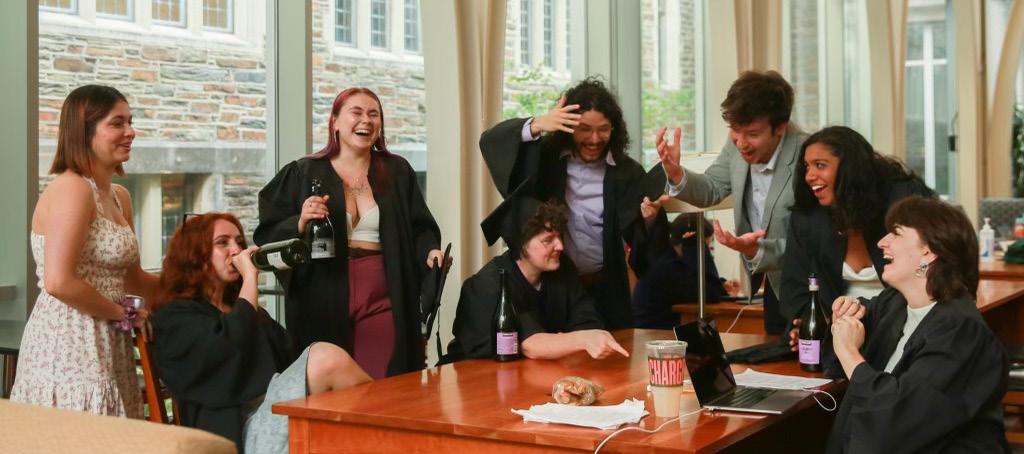
Geraci pointed to how the Class of 2023 went through a “normal” first-year experience, followed by a “totally COVID” sophomore year, a “half-normal” junior year and a “super, super normal Duke” in their final year.
This was especially true for Tegerdine, who is graduating after three years. Tegerdine enrolled at Duke in the fall of 2020 and spent his first year of classes nearly all online, with a return to pseudo-normalcy during his second year.
“I feel like I almost took a four-year college experience, and I turned it into a year and a half. And that’s very strange to think about,” he said.
For Roth, restrictions and online classes during the pandemic made it so there was “no social interaction whatsoever.” At the same time, Roth pointed to how campus reopening made her final years at Duke “much more exciting.”
Tegerdine agreed, feeling as though it is “far easier to feel in community with people or just recognize people” after the pandemic than it was during the pandemic, although “that also might just come with time.”
See SENIORS REFLECT on Page 16
By Senou Kounouho University News EditorNational Basketball Association Commissioner Adam Silver, Trinity ‘84, will deliver the commencement address for the Class of 2023.
Once people heard the news, Silver said that they were excited.
“When people found out I was going to be the commencement speaker at Duke, [what they said] was along the lines of, ‘Wow, what a fantastic honor.’ Pause. ‘I can’t remember who my graduation speaker was.’” Silver said in an interview with The Chronicle.
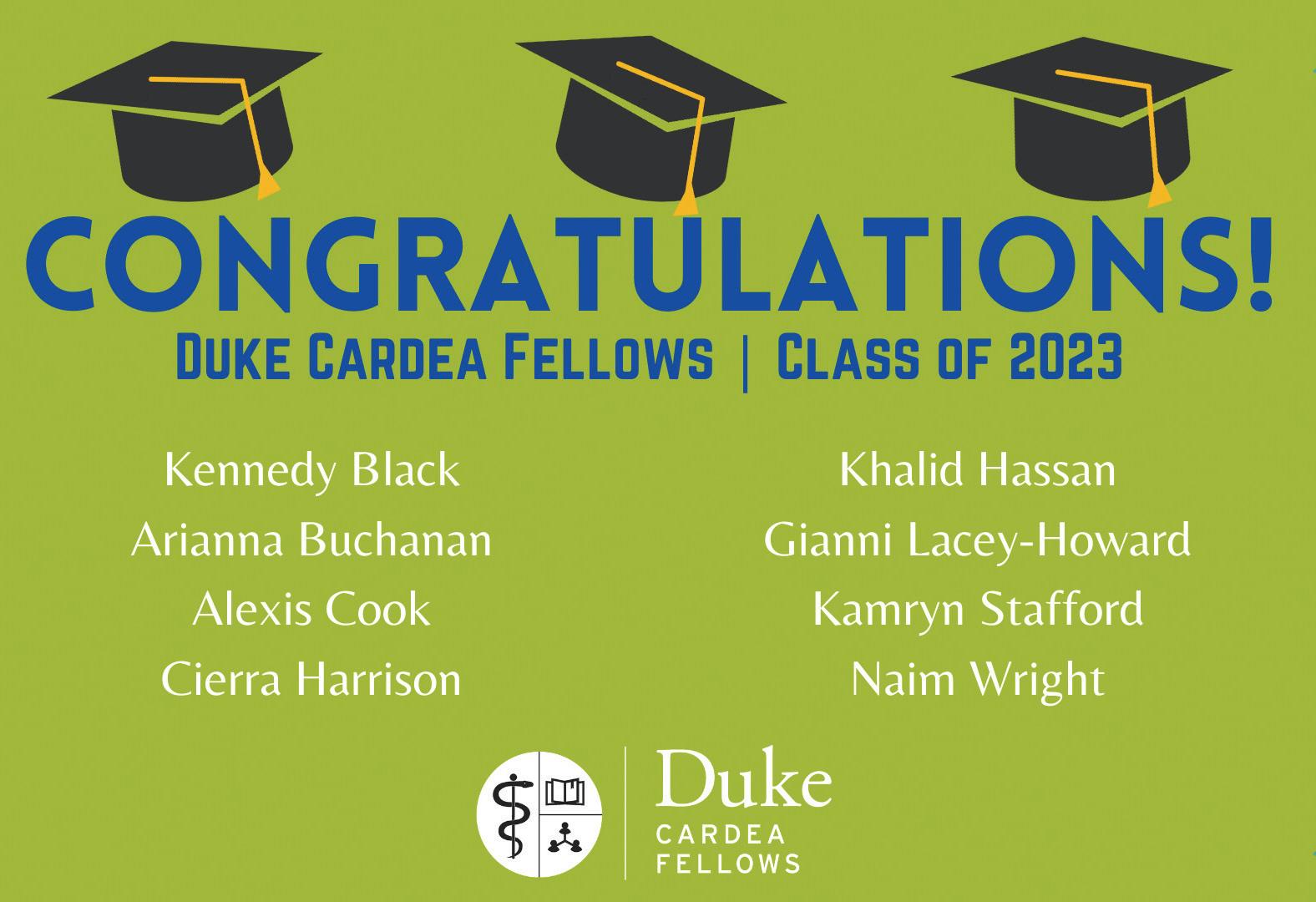
But Silver, unlike those who congratulated him, does remember who the speaker was at his graduation — and for him, it was most impactful.
The commencement speaker for the Class of
1984 was Katharine Graham, chairwoman of the Washington Post Company. Graham had led the Post as publisher during the infamous Watergate scandal, which ended in the resignation of former President Richard Nixon, Law School ‘37. Silver described the event as a generational marker.
“Not only was I a political science major,” Silver recalled. “I had already moved to Washington, D.C., to work for Congress at the time of my graduation, so Katharine Graham was a particularly meaningful person to me. And while I can’t remember her precise speech, I remember her speaking about the importance of an independent and free media for our democracy.”
See ADAM SILVER on Page 17
‘That experience alone is priceless’ Seniors reflect on Duke community, personal growth
‘Their Duke experience is just beginning’
NBA Commissioner Adam Silver, Trinity ‘84, looks back on his time at Duke before delivering his commencement speech.Courtesy of Rebecca Schneid See more GRADUATION PHOTOS on Page 16
While the Class of 2023’s first year at Duke will forever be infamous for the University’s transition to empty quads and online courses, the year was also remarkable thanks to student activism, campus renovations and basketball games for the ages.
It was a busy year when it came to student life. First-years were barred from O-Week parties, and alcohol was banned from fraternity rush events. Electric scooters began to litter campus sidewalks, though the University placed restrictions on their use. As for student elections, junior Tommy Hessel was elected Duke Student Government president and senior Ibrahim Butt was elected undergraduate Young Trustee.
The Class of 2023’s first year also saw its share of controversy. Over the summer, Duke agreed to pay $54.5 million to settle a class action antitrust lawsuit after the plaintiff alleged that Duke and the University of North Carolina at Chapel Hill had agreed not to hire each other’s employees.
Duke’s Department of Education sent a letter criticizing the Duke-UNC Consortium for Middle East Studies, after which President Vincent Price and Provost Sally Kornbluth reaffirmed the University’s commitment to academic freedom.
Two fraternities faced disciplinary action: Duke’s Delta Sigma Phi chapter was shut down in September due to “risk management problems,” and the University suspended its Sigma Alpha Epsilon chapter in November and required members to move out of their housing section.
Students made their voices heard throughout the year, protesting tech company Palantir and a talk by John Bolton, former national security advisor to President Donald Trump. During a weeklong global climate strike in September, students held a rally on the Bryan Center plaza.
Alumni, students and faculty won prestigious awards this year. William Kaelin Jr., Trinity ‘79 and School of Medicine ‘83, and a member of the Board of Trustees, shared the Nobel Prize for Physiology or Medicine for his research on how cells sense and adapt to oxygen availability.
Senior Gabriella Deich, who co-founded the Arete Fellowship at Duke, was named
Duke’s 50th Rhodes Scholar, and Jenny Tung, Trinity ‘03 and Graduate School ‘10 and an associate professor of evolutionary anthropology, won a MacArthur ‘Genius’ Grant for $625,000.
Demolition, construction and renovations changed the face of Duke this year. Construction crews began tearing down Central Campus, and students moved into Hollows Quad for the first time. Ahead of the spring semester, popular eatery Pitchfork’s also got a new look.
Meanwhile, some familiar faces announced their departure. Richard Riddell announced Oct. 1 that he would be stepping down in June as senior vice president and secretary to the Board of Trustees. Two weeks later, Duke announced then-Executive Vice President Tallman Trask’s retirement. Mary Pat McMahon became vice president and vice provost for student affairs, succeeding Larry Moneta, and Dean of Students Sue Wasiolek announced that she would move into a new advisory role during the 2020-21 academic year.
The University community mourned the loss of three Duke students and alumni during the academic year. Morgan Rodgers died in July. Grey Spector and Raj Mehta died in March.
The last two months of the academic year were anything but ordinary. The first hint of the coming storm came Jan. 25, when Duke Kunshan University announced that classes would be suspended until midFebruary. DKU courses moved entirely online Feb. 24.
Back in Durham, life went on, but Duke banned University-funded travel to China and eventually announced that students who traveled to areas with a high risk of COVID-19 exposure would have to self-quarantine before returning to campus.
On the athletic front, the baseball and softball teams had outstanding seasons. Bryce Jarvis pitched the first nine-inning perfect game in the baseball program’s history, and it seemed possible that the team would make it to Omaha for the College World Series. The softball team finished 23-4 and was ranked 25th in the last ESPN/USA Softball poll after a nine-game win streak, their first time being ranked in a major poll.
Duke football had a lackluster season, finishing with five wins and missing a bowl game for the first time since 2016. The women’s basketball team got off to a rocky start but ended the regular season third in the ACC.
The men’s basketball team posted a pair of dazzling wins over rival North Carolina. After a comeback for the history books in Chapel Hill, Dean Sue sat atop a bench to stop students from burning it. Students got their second chance a month later, after a second victory over the Tar Heels that featured a spectacular senior night from Justin Robinson.
Despite an exciting start, the men’s basketball team’s season was brought to a crashing halt.
Three days after Robinson’s shining moment in Cameron, and midway through spring break, students began to receive hair-raising emails from University administrators. Classes were moved online, athletic activities were suspended, and students were told not to return to Durham to collect their belongings. By the end of a tumultuous extended spring break, it was
clear that the Class of 2023’s first year would not end in a normal fashion.
Students and professors adapted to holding classes on Zoom, and undergraduate classes became satisfactory/unsatisfactory by default. Research labs adjusted to restrictions. Durham Mayor Steve Schewel issued a stay-at-home order and local businesses closed.
Yet amidst the hardship, the Duke community came together. Within days of the announcement that classes would move online, the Duke Mutual Aid Facebook group had formed to help members of the Duke community impacted by the pandemic. The University created three relief funds with seed funding of $9 million, and Duke researchers turned their attention to creating a vaccine for the virus.
Students celebrated the last day of classes with a Zoom concert. Commencement was postponed, and seniors attended a virtual celebration called Marking the Moment to commemorate their graduation.
And on a quiet campus, the bells of the Duke Chapel continued to ring.
Eric Wei By Nathan Luzum February 8, 2020
By Nathan Luzum February 8, 2020
After a win for the ages against the University of North Carolina at Chapel Hill, students were fired up to burn benches. There was only one problem — Duke didn’t have a permit.
Students dragged the bench for Sherwood House onto the quad, but Dean of Students Sue Wasiolek planted herself atop the bench for around 45 minutes to prevent students from lighting it on fire. As students chanted at Wasiolek, others attempted to give her a handle of vodka and White Claws, which she declined to drink. Some students also approached the bench with lighters and a small blowtorch, but did not set it aflame.
Eventually, when they realized a bonfire wasn’t in the cards, students began filing over to Cameron Indoor Stadium to welcome the team back.
“I have great appreciation for the school spirit, and I love to encourage that in any way I can,” Wasiolek told The Chronicle after stepping down from the bench. “But I just felt it was very
important not to burn that bench. I really want to preserve the opportunities in the future to be able to burn with a permit. If we do it illegally now, we’re not going to get a permit in the future.”
Bench-burning permits are granted for only four games out of the year, she explained. The University has permits for both the men’s and women’s home basketball games against UNC, in addition to the men’s and women’s National Championship game — but none for an away game in Chapel Hill.
“What I didn’t want to have happen is any students get in trouble by burning the bench,” she said. “It’s not a matter of whether we could have controlled it and tried as best we could to make it safe, but it’s illegal. It’s against the law. I’m not sure students understand that. I don’t mean that in a condescending way, but the law is very clear.”
Wasiolek knew that she might have to intercede even before the Sherwood bench was dragged into the quad following the Blue Devil win. Students have reacted this way to close victories in the past, she said, noting that this was
the third time in her career pacifying a group of students dead set on burning benches.
“I didn’t think it was going to happen tonight because of the weather,” Wasiolek explained. “And then I called Duke Police just to see if they knew of anything going on, and they called me back and said it might be helpful for me to find my way to the main quad.”
In response to being handed several alcoholic beverages by students begging her to allow a fire, Wasiolek noted she wasn’t tempted to crack one open.
“Someone handed me some vodka, some White Claw,” she said. “This is not an appropriate time or place for me to be consuming alcohol, frankly. There’s a time and a place, but this wasn’t it.”
As students continued to surround the bench and serenade Wasiolek, Mary Pat McMahon — vice president and vice provost for student affairs — was surveying the fray from the edge of the quad. She told The Chronicle that they were trying to get a bullhorn to Wasiolek. However,
students filed away before she could receive it.
Despite several students approaching the bench with lighters and a blowtorch, Wasiolek said she wasn’t afraid that the bench would burn.
“The good news is that the collective levelheadedness of the crowd, other students made sure that didn’t happen,” she said. “I was greatly appreciative of that.”
As the crowd thinned out, students began climbing atop the bench and taking selfies and pictures with Wasiolek, which she described as “awesome.”
There also wasn’t a possibility of acquiring a permit on short notice. Associate Dean of Students Clay Adams and McMahon said that the permits had to be granted 90 days in advance, so there was no chance to apply for one on the spot.
In 2001, benches were burned without a permit in Duke’s legendary comeback win against Maryland. After students set them aflame, the Durham fire marshal rescinded the permit for a future game, but was persuaded to return it days later after discussion with administrators.
Days after Duke canceled in-person classes and restricted access to campus, students have come together to help each other navigate lives altered by the coronavirus.
Students formed the Duke Mutual Aid Facebook group, which aims to provide help in the form of food, housing and transportation for members of the Duke community affected by the University’s decision to close campus. Students have also created a Google Drive folder with a frequently asked questions document, a form for offering assistance, a form for receiving assistance and other resources through Mutual Aid.
“The group’s main objective is to use the creativity of the Duke community, the resourcefulness of the Duke community and have a sort of grassroots, Duke-studentoriented way to help other students on this campus,” said junior Jamal Burns, an administrator on the Mutual Aid page.
Students, alumni and other community members can fill out Mutual Aid’s Google form to offer assistance if they are able to provide it to students who face “financial difficulties, food insecurity, housing loss” and other challenges after the shift to online classes and the closing of Duke’s campus. Students who wish to request aid can see responses on a spreadsheet and reach out to those who complete the form.
The form notes that it is “not part of the official response” of the University and that Duke is responding to questions at the email address keeplearning@duke.edu.
Burns and several other students started working on the FAQ document, which is separate from the Mutual Aid page, immediately after Duke suspended in-person classes March 10 and urged students who had traveled for spring break not to return to campus. The 12-page document includes
information on financial aid, housing, food, academics and other subjects.
“Immediately, a lot of students started to ask me a ton of questions,” Burns said, which he said was because of his role as co-president of Duke LIFE (Low-Income, First-Generation Engagement). “Me and these other groups of individuals… had to think quickly on our feet and make a document by reaching out to administrators and getting answers to these questions that we didn’t even know the answers to ourselves.”
The students created the document so that people wouldn’t “left in the dark,” he said, which involved “decoding the ambiguity of some of the emails that we were sent.”
First-year Lily Levin, also a columnist for The Chronicle, created the Duke Mutual Aid Facebook group Friday morning, though she noted that it was originally another student’s idea. A similar page for students at the University of Chicago, UChicago Mutual Aid, served as a model.
“I think Duke is trying to respond to what it needs to do to keep [the] University safe, and in that sense isn’t really doing as much for the community in terms of housing requests, food, transportation. I think it’s more of a second priority,” she said. “So for us, it’s making that our first priority.”
The group grew out of a group of students who were already in touch because of a shared interest in issues like fossil fuel divestment and Palantir’s presence at Duke, said senior Gino Nuzzolillo, an administrator on the page. Nuzzolillo, also a columnist for The Chronicle, criticized Duke’s response to the coronavirus situation, including the way Duke further restricted access to campus after previously telling students they could return to get their belongings. Students have to help each other, he said.
“I think at the end of the day, the only people that we can really rely on are each
other,” Nuzzolillo said. “And we need to be able to help each other out through a really stressful and scary situation, and that’s the role that the Duke Mutual Aid group fills.”
Michael Schoenfeld, vice president for public affairs and government relations, said that Duke further restricted access to campus because it was worried about thousands of people coming to campus for a “reverse move-in.” He added that it would defeat the purpose of what the administration is trying to do, which is limiting the opportunity for exposure on campus.
“There’s an army of people who are working on the plans to make sure that students can get what they need to do their work and to return home or go to some other location,” he said.
Nuzzolillo joined several other Mutual Aid admins and scores of other students in signing a letter to the University that made a number of demands related to the situation.
Sophomore Emma Cairns, who received approval from Duke to continue living in the Duke Smart Home, started the group’s food-collection effort after a friend who was leaving campus texted her and offered to give her some extra food. She realized that many students were probably going to leave behind food when she left, so she decided she would collect extra food to give to the Community Pantry or the Inter-Faith Food Shuttle.
Cairns posted on Instagram, Twitter and her personal Facebook, but the messages started “pouring in” after she posted to the Mutual Aid page, she wrote in an email to The Chronicle.
“I’ve had about, I think, 50 people give me food,” she said Saturday. “I’ve only been able to collect about 20 people’s worth so far. My friends who have cars have been angels, helping me get things from West and East over here.”
Cairns has now taken donations of cereal, ramen, pasta, rice, beans, drinks and more. She plans to start distributing it once she has finished collecting donations.
The group also aims to provide housing for students who don’t have a place to stay.
Duke is allowing some students to stay on campus for health or safety reasons, but some international students whose requests to stay were denied told The Chronicle they were looking for housing off campus because they didn’t want to risk traveling home. One of the students said he was looking at Mutual Aid as an option.
The group’s mission has already expanded beyond the core areas of food, housing and transportation. Students set up a Venmo account, @dukeaid, to facilitate direct cash donations. Others have taken to the Facebook group to share information like guidance for students on financial aid and companies offering free internet and flights, a Durham-focused relief fund.
“Things are changing all the time, and as students’ needs change I think the group will also change,” Nuzzolillo said.
Beyond the Facebook page, other current and former students are stepping up. Duke Student Government President Liv McKinney, a senior, wrote in a message to The Chronicle that DSG was working with administration to help students. Former Duke basketball star Zion Williamson pledged to pay the salaries of all employees at Smoothie King Center, the New Orleans Pelicans’ arena, for 30 days, which Cairns said was inspiring to students who wanted to help each other.
Burns said the Mutual Aid group is mostly focused on “material” support right now, but he hopes it can become a place for students to socialize and stay connected while they’re apart.
For him, the group has already fostered a sense of “solidarity” and “connectedness” for
See DUKE MUTUAL AID on Page 16
Even with campus nearly empty and students scattered around the world, Duke’s voice continues to sing.
At 5 p.m. every weekday, the bells of the Duke Chapel’s carillon play for 15 minutes, as they have for decades. From a room partway up the Chapel tower, Joseph Fala, interim carillonneur and staff specialist for Chapel music, plays a melody of hope and stability in a time of uncertainty.
“The school is still very much alive,” Fala said. “It’s almost like a candle lit in a window — there’s some light in the sound of the bells that are still perpetuating on campus.”
For him, the ringing of the bells signifies that the University will not be silent during the crisis caused by the COVID-19 pandemic. Each stroke of the keyboard or push of the foot pedal causes a clapper to knock against a bronze bell, producing a chime that challenges the eerie quiet on campus. Meanwhile, classes and services persist, even if the students and congregation are scattered across the globe.
Fala, who is also an organ scholar with the Chapel, said the sound of the carillon is an ingrained part of the campus architecture. The Chapel itself is singing, and he is simply the one behind the scenes operating it.
In this, he echoed the words of former Duke President William Preston Few, who led the University when it took on its current name in 1924. When George Allen and William Perkins of the Duke Endowment told Few in 1930 that they wanted to donate a carillon to the school, Few wrote in a letter that the “Chapel bells will in a sense be the voice of the University.”
The bells also stand as a pillar of dependability and consistency in these turbulent times. Carillonneurs at Duke have been striking the instrument’s pedals and oak batons up in the Chapel tower every weekday for almost 90 years.

“To have [the carillon] continue to play is a way of saying that the campus is still as it always has been and will continue to be that way,” Fala said. “Keeping that momentum or rhythm of the daily ringing of the bells is what is so inspiring to a lot of people.”
Fala has the freedom to choose which songs he will play for each 15-minute recital. Aside from the tradition of playing “Dear Old Duke,” the University’s alma mater, on Friday afternoons, he tries to select songs that reflect the upcoming holidays and spirit on campus,
such as playing scores from “Beauty and the Beast” on Valentine’s Day. Now, he said he is focusing on hymns that speak to hope, comfort and healing.
Despite the trek up 169 steps to the bells, Fala said he looks forward to playing the carillon every day. He hopes that he is carrying out what his predecessor, Samuel Hammond, would have done. Hammond was Duke’s second university carillonneur and played the bells for five decades, which Fala said was his form of daily prayer.
Duke’s carillon is purely mechanical, and according to a listing by the World Carillon Federation, it is one of about 170 such instruments in the nation. Its 50 oak batons and 26 pedals control 50 bells, cast in England, that allow the instrument to span four octaves.
With the largest bell weighing 11,200 pounds, and the smallest weighing 10.5, Fala said he has to put his body weight into it when he plays.
The carillon chamber has a practice console, allowing Fala to perfect new songs to add to his repertoire without disrupting campus, and he now practices about an hour a day. He said he hopes to one day become Duke’s third university carillonneur, a position that he views as akin to an artist-in-residence at the University.
Despite the nearly empty campus, Fala feels a greater sense of duty now than ever.
Although much of the Duke community is not within the half-mile earshot of the chiming bells, the Chapel has continued to have services through livestreams and videos. Hopefully, there will soon be an opportunity to hear the bells virtually as well, he said.
“Keeping the bells sounding throughout this challenging period is a sign of hope and a reminder that the ministry of Duke Chapel continues… even though it looks a little different,” Director of Chapel Music Zebulon Highben wrote in an email.
Fala hopes that when everyone is back on campus, the Duke community will be more aware of the carillon that chimes as the University’s voice.
“When I go up into the tower, I get into the zone playing, and I think about the time when the students will be back here, and down on the ground, it’ll be a busy, thriving university again,” Fala said. “I think playing is one of the things that — for whoever is on campus and whoever hears them — will serve as hope to people for the day when we’ll all return to campus together.”
The Class of 2023’s sophomore year saw activism, a disappointing basketball season and adjustment to a new normal.
The summer preceding the semester saw solidarity and activism related to the Black Lives Matter movement following the murder of George Floyd. Students hosted benefit concerts, letter writing campaigns and started anti-racist book clubs. The Duke Black Coalition Against Policing (BCAP) issued a list of demands that called on Duke to disband the Duke University Police Department and invest in the Duke and Durham communities. The University also announced a plan to combat systemic racism.
The activism continued into the school year, with a K-Ville protest organized by Nolan Smith, Duke men’s basketball’s director of operations.
Duke’s fall reopening did not come without its issues.
The University’s decision to reopen in the fall without consulting workers prompted activism from graduate students and Duke Workers United, a group that represents the Duke Faculty Union, Duke Contract Workers United and other workers groups representing municipal employees and transit workers.
Weeks before reopening, Duke walked back some reopening plans that left some upperclassmen without oncampus housing, resulting in a mad dash for off-campus apartments for some and resignation from others.
The year also saw a consequential presidential election, and student political groups and advocacy groups mobilized to get out the vote. Some students adjusted voting plans due to North Carolina limiting registration to college students physically present in their college community.
In October, then presidential nominee Joe Biden spoke in Durham, criticizing the Trump administration’s pandemic response and calling on people to vote.
Though Donald Trump won the state of North Carolina’s electoral votes, Biden and Vice President Kamala Harris were ultimately elected, and Biden-supporting Durham residents and students celebrated.
Some Trump supporters, however, challenged President Biden’s victory, including Representative Mo Brooks, a Duke alum. On Jan. 6, a pro-Trump mob, egged on by Brooks, stormed the Capitol the day of the certification of election results.
But despite the stress and loneliness of the condensed semester, the fall was not without its bright spots. One came in the form of the international hit Library Takeout, a song written to explain Duke Library’s new contactless reserve system.
This year also saw major changes in Duke’s Greek life and selective living.
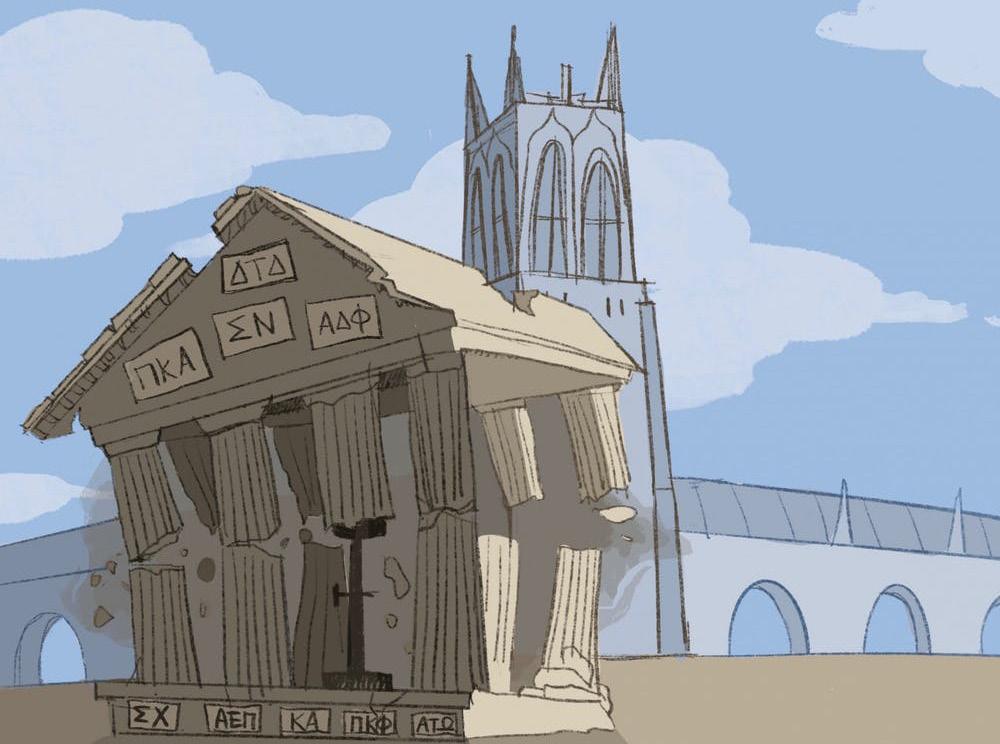
The Abolish Duke IFC & Panhel group began with the creation of an Instagram page in mid-July for students and alumni to share anonymous stories about their experiences in Duke Greek life, including experiences with racism and sexual assault.
In part because of activism from Abolish Duke IFC & Panhel, chapters of Zeta Tau Alpha women’s fraternity and Alpha Delta Pi sorority attempted to decharter, albeit unsuccessfully. Duke’s Panhellenic Council also voted to ban mixers with all-male groups.
Selective living groups were allowed to host virtual recruitment this spring though most were not allowed to recruit first years. Some groups decided to cancel rush entirely.
Others took a different approach. Several fraternities disaffiliated from Duke early in 2021 — forming the Durham Interfraternity Council — and began in-person rush processes. These rush events contributed to a spike in campus COVID-19 cases and resulted in a “stay-in-place” order in mid-March.
In January, students were introduced to the Duke Marriage Pact and in February, to virtual tenting for the Duke-UNC basketball game.
The men’s basketball team lost both regular season games to the Tar Heels and, for the first time since 1995, missed the NCAA tournament. The team was also forced to withdraw from the ACC tournament due to a positive COVID-19 test within the program.
But it was not all bad news for Duke athletics. Then associate head coach Jon Scheyer earned his first career win
when head coach Mike Krzyzewski was quarantined due to potential COVID-19 exposure. Duke women’s golf won the ACC championship and Gina Kim won the individual conference crown.
In August, Duke implemented new Title IX changes without giving the community time to offer feedback.
In October, Duke’s social media team posted a racially insensitive meme on Twitter to much backlash, only removing the tweet after almost 21 hours.
In March, a racist printout was hung in Brown dorm, an act for which no responsible students have been found. Students criticized administrators’ response to the incident.
In the wake of a shooting in Atlanta that killed eight people, including six women of Asian descent, Judith Kelley, dean of the Sanford school of Public Policy, sent out an email that failed to properly name the victims. In response to rising anti-Asian violence, Asian student groups released a list of demands, calling for the University to provide greater support for students.
This year also saw the renaming of several campus buildings, including the renaming of the Sociology-Psychology Building to the Reuben-Cooke Building and Jarvis dorm to West Residence Hall.
The University congratulated Rhodes Scholars Jamal Burns and Kendall Jefferys, both seniors. Senior Doha Ali was chosen for Young Trustee in an overhauled selection process.
Students enjoyed a virtual LDOC concert with Flo Milli and Dayglow. After initially restricting the attendees, Duke invited all seniors and students who graduated early to the commencement ceremony for the Class of 2021. Plans again changed to allow each member of the class to bring two guests.
The Duke community mourned the losses of three of its members this year. Graduate student Michael Mutersbaugh died in December and senior Kenna Tasissa died in January. Longtime carillonneur J. Samuel Hammond died in February.
Nine fraternities have broken away from Duke’s Interfraternity Council after Duke announced changes to the rush process and selective housing, forming a new group called the Durham Interfraternity Council that has begun recruiting new members.
In November, Duke announced that recruitment for firstyears would be delayed to sophomore year and that only juniors and seniors would live in selective living sections next year. These changes are part of the guidelines for Duke’s Next Generation Living Learning 2.0 Committee.
According to Durham IFC President Will Santee, a junior, these changes posed a number of challenges to fraternities. Primarily, delaying rush to sophomore fall would be difficult “especially since so many juniors go abroad” and limiting selective living sections to juniors and seniors “wasn’t exactly conducive to the best living situation for sophomores,” Santee said.
Santee said that it seemed as though the University “has a very set plan of where they see social life going at Duke” and the disaffiliated fraternities didn’t feel like that plan included them.
Former Duke IFC President Rohan Singh, a senior, claimed that the IFC was not consulted by Duke when the University temporarily suspended spring recruitment in October and decided to move rush to sophomore year in November.
Mary Pat McMahon, vice provost and vice president of student affairs, said that IFC was the first student group she met with to seek input on changes to rush. She added that she consulted national Greek organizations, Duke Student Government and dozens of other student groups in more than 100 preview meetings before the November policy announcement.
Durham IFC is composed of Alpha Delta Phi, Alpha Epsilon Pi, Alpha Tau Omega, Delta Tau Delta, Kappa Alpha Order, Pi Kappa Alpha, Pi Kappa Phi, Sigma Chi and Sigma Nu.
Joseph Robinette Biden Jr. was elected the next president of the United States on Saturday.
Biden will enter office with a vision for liberal governance, including plans to implement a coordinated national response to COVID-19, invest in green energy, expand Obamacare, implement criminal justice reform and undo Trump’s immigration policies. During the campaign, Biden offered the promise of a return to normalcy after four years of chaotic governance under President Donald Trump.
His running mate, Senator Kamala Devi Harris (D-Calif.), is the first woman, the first Black person and the first person of Indian descent elected vice president.
“I sought this office to restore the soul of America, to rebuild the backbone of this nation, the middle class and to make America respected around the world again,” Biden said Saturday night, in a victory speech in his hometown of Wilmington, Delaware.

The president-elect thanked the American people for turning out in record numbers to make his victory possible, and he emphasized his commitment to rebuilding and healing the nation. He listed his priorities for the next four years, including tackling climate change and racial injustice, but stressed that his first battle will be against a pandemic that has killed more than 230,000 Americans.
Harris took the stage before Biden and thanked the American people for ushering in “a new day in America.” She reflected on the historical importance of her election as the first woman in the office of Vice President, as well as the first Black or South Asian person in the position.
“But while I may be the first woman in this office, I will not be the last. Because every little girl watching tonight sees that this is a country of possibilities,” Harris said.
Biden’s victory marked the conclusion of a long election whose results were delayed by waits over ballot counts. News organizations including the Associated Press and CNN projected at around 11:30 a.m. Saturday that Biden had won Pennsylvania, and thus the presidential race.
Trump has not yet conceded the race, despite Biden’s projected victory, promising unspecified legal challenges to the results.
On election night, with many votes still to count, the electoral map had not shown a clear winner: Trump was ahead in key swing
states like Pennsylvania, North Carolina and Georgia, while Biden had pulled ahead in Arizona and Nevada.
But as the remainder of absentee ballots were counted, crucial states swung to Biden. He won Wisconsin and Michigan, putting him at 253 electoral votes, even as the Trump campaign embarked on legal challenges to seek a recount in Wisconsin and to attempt to halt the count in Michigan. An early call of Arizona — putting Biden at 264 electoral votes — by the AP and Fox was also met by pushback from the Trump campaign, but both decision desks stood by the decision.

As votes were tallied, Biden called for patience and trust in the “messy” process of democracy, while Trump made false claims about attempts to steal the election and falsehoods about voter fraud.
In the early morning Friday, Biden pulled ahead of Trump in Pennsylvania and Georgia. He continued to hold his leads in Arizona and Nevada.
“The numbers tell us a clear and convincing story: We’re going to win this race,” Biden said in a Friday night speech.
Students involved in progressive advocacy were thrilled at the news of the victory.
“We are so just happy, so relieved and so proud of the outcome and of the work that we’ve done,” said sophomore Daniel Marshall, Duke Students for Biden co-chair.
GENDER, SEXUALITY & FEMINIST STUDIES FIRST MAJORS
Danica JoAnn Schwartz
GENDER, SEXUALITY & FEMINIST STUDIES SECOND MAJORS

Chaya Brennan Agarwal (1st Major in International Comparative Studies)
Claire Isabella Budzik (1st Major in Asian & Middle Eastern Studies)
Gabrielle Anne Marie Butler
(1st Major in Evolutionary Anthropology)
Laila Grace Edelman (1st Major in Biology)
Brandi Nicole Martin (1st Major in English)
James Mbuthia Ndung’u (1st Major in International Comparative Studies)
GLOBAL GENDER STUDIES MAJORS
Audrey Irene Alexander (Interdepartmental Major with International Comparative Studies, 2nd Major in Global Health)
Amanda Jill Padden (Interdepartmental Major with International Comparative Studies)
GENDER, SEXUALITY & FEMINIST STUDIES MINORS
Ila Amiri
(Major in Public Policy)
Madeleine Clare Downey
(Major in Psychology)
Lorayna Anne Hinton
(Major in Psychology)
Payton Clark Little
(Major in Public Policy and Global Health)
Rebecca Paige Schneid
(Major in English)
Anna Grace Shenk-Evans
(Major in Environmental Sciences)

Nicole Elizabeth Stepovich
(Major in Neuroscience)
Kiran Sundar
(Major in Psychology)
SEXUALITY STUDIES MINOR
Daniel Lee Sutton
(Major in Linguistics)
GRADUATE STUDENTS COMPLETING THE CERTIFICATE IN FEMINIST STUDIES
Carolin Benack (PhD, English)
Jieun Cho
(PhD, Cultural Anthropology)
Julien Fischer (PhD, Literature)
Although the overall race has been called, the result in North Carolina is still not certain. Trump holds a lead and is likely to win, but some ballots remain to be counted and the race may not be called until next week.
Marshall said Duke Students for Biden had made a difference, pointing out that early voting at Duke had increased more than 50% between 2016 and 2020.
“We still don’t know about North Carolina. It still could go either way. But we know that Joe Biden won,” Marshall said.
Robby Phillips, a sophomore involved in the Sunrise Movement, a climate activism group, said Biden’s win came as a “huge moment of relief.”
The wait for the result over the past few days was harrowing, and he hadn’t been able to finish much work since he had been constantly checking the results, he said. Even though the electoral map looked hopeful, he had still been afraid Trump could eke out a win, Phillips said.
Those fears are behind him now.
“It feels like maybe the most difficult part is past for now, closing the book on a pretty dark chapter,” he said.
Editor’s note: This story has been shortened for print.
**Doctor of Philosophy
** Hannah Borenstein
** Jieun Cho
** Koffi Nomedji
** Christopher Webb
**Majors
**Kristin Ewurekua Ankoma-Sey
**Maile Midori Lehrer
**Lilly Ma
**Maurice McIntyre
**Colton Reese Ortiz
**Preetha Ramachandran
**Hannah M. Shuffer
**Sayyid A. Stevens
**Elijah Isaiah Wroten
**Second Majors
**Rebekah Alvarenga
**Yu Yi Liang
**Interdepartmental Majors
**Avery Mia Lythcott-Haims
**Dance - Cultural Anthropology
**Kyra Elizabeth Varley
**Sociology - Cultural Anthropology
**Qintian Zhang
**Neuroscience – Cultural Anthropology
**Minors
**Evan Shaun Abramson
**Julia Cameron Bateman
**Alexis Imani Cook
**Conner Bowman Drake
**Caroline Miette Fiore
**Nicholas Alexander Guardado
**ZhiChen Guo Liau
**Yuxuan Hua
**Neica Ivens Joseph
**Katherine Kim
**Alexander Izmael Leo-Guerra
**Shibani Thalia Mallik
**Connor Brian Wilchusky
**Isabel Ann Wood
* Fall 2022 graduates
** Graduation with Distinction

AUG. 27, 2020 — Henry Coleman III approached a single microphone during an August Black Lives Matter protest in Krzyzewskiville. He sported a black T-shirt with the words “Black Lives Matter” across the front, accompanied by Duke basketball and Nike logos.

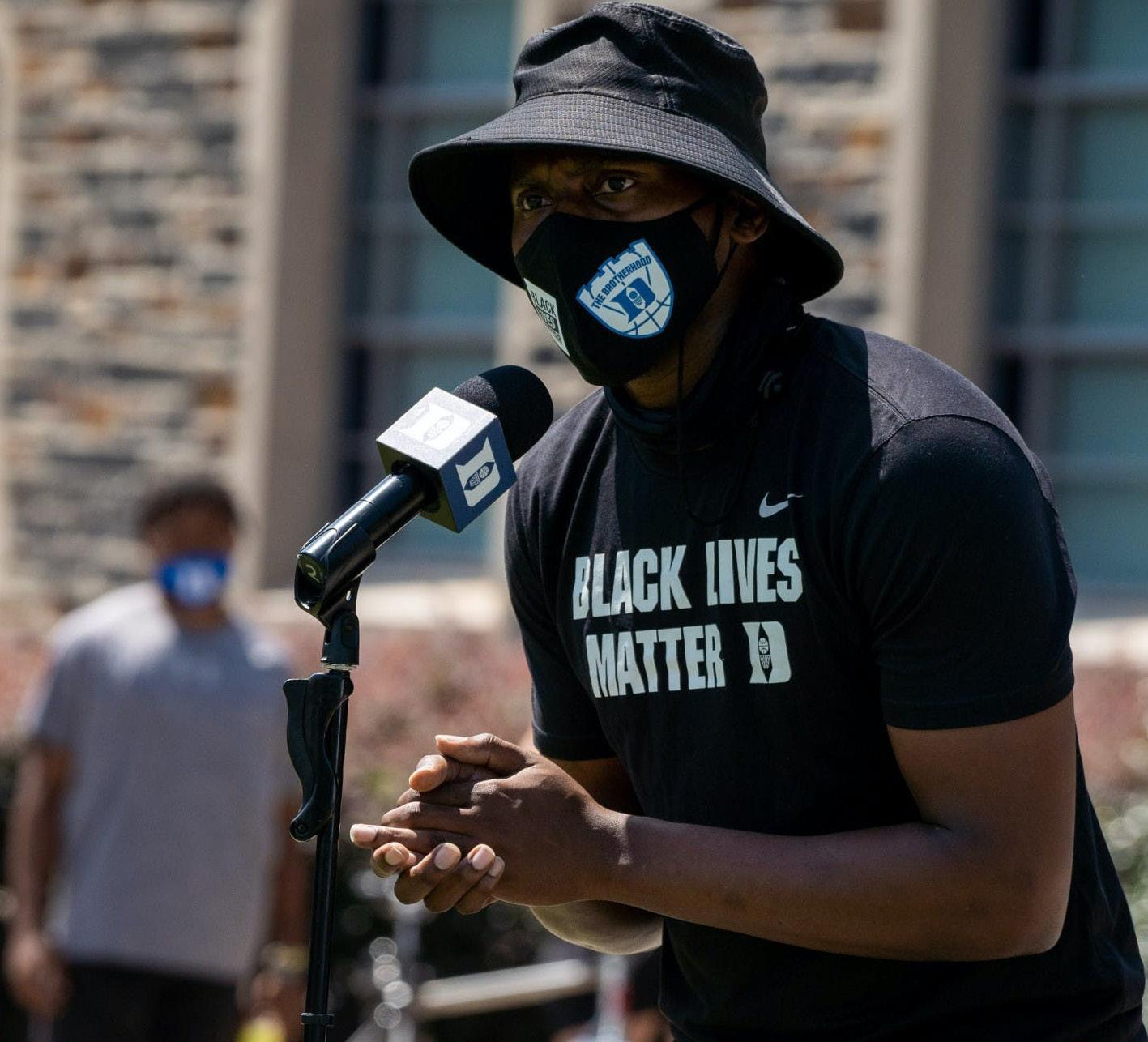

His Blue Devil teammates liken his athleticism and towering physical stature to former Duke phenom Zion Williamson, but Coleman has become better known for being powerful in a completely different sense.
In the next two minutes and 30 seconds, more than 100 spectators looked on as Coleman made himself a Duke legend before he had even notched a minute of playing time in Cameron Indoor Stadium.
“This country has had its knee on the necks of African-Americans for too long,” Coleman said at the protest. “This country has put a dagger in our backs and is yet to even acknowledge the dagger, let alone try to pull it out.”
Coleman’s speech was one of several during a Black Lives Matter protest that took place at Krzyzewskiville on a sweltering afternoon Thursday, days after the Aug. 23 shooting of Jacob Blake in Kenosha, Wis. reopened the wounds of police violence and racial justice in America. Protests erupted in Kenosha. The NBA postponed three of its playoff games after the Milwaukee Bucks chose not to play on Wednesday, and many other sports leagues followed suit.
People stood on the grass, where white splotches of paint marked spots six feet apart. Many of the protesters wore black clothing and clutched cardboard signs: “Love Black Lives like you love Black culture” and “Tolerating racism is racism.”
As Coleman continued, the entire Duke men’s basketball team came up behind him. When the raw emotion caused Coleman to get choked up, fellow first years Jaemyn Brakefield and Mark Williams placed a hand on each of his shoulders, a sign that even though this team had been together for less than a month at the time, unbreakable bonds had already formed.
“When those guys came up behind me, it was almost like a security blanket,” Coleman said in an August press conference. “I just felt like those guys around me — they felt the message with me.”
Coleman wrote his speech the night before the rally, the same night the NBA opted to not play its scheduled playoff games in the wake of the Jacob Blake shooting. As the professional sports world assessed the best steps to take for social justice, Nolan Smith, Duke men’s basketball’s director of operations, was doing the same.
Coleman’s platform for the speech was possible due to the work of Smith in setting up the Krzyzewskiville protest. At the protest, Smith took the microphone first and talked about the importance of making sure that “this is not a moment, this is a movement.”
“I can’t change the world,” Smith said. “But goddamnit, I can change Duke while I’m here.”
Men’s basketball head coach Mike Krzyzewski also took the platform.
“Today is for all of us to acknowledge this problem, to share our feelings,” Krzyzewski said. “This is a time for us to be all on the same team.”
He called the audience to take concrete action by registering to vote, noting that tables had been set up outside Cameron Indoor Stadium for both basketball teams to register.
This generation is the one that can truly bring about change — the generation that can finally win — he said.
“I grew up a long time ago in the [1960s]. I thought it was heading in the right direction. Damn, I was wrong,” he said. “I want to be right. I want to be on your team. And I want this systemic racism and social injustice to be defeated.”
Senior Michael Buckmire also spoke, holding up a sign that read, “Am I next?” as he gave a speech.
“There’s this idea of survivor’s guilt of other Black men seeing other Black men being killed. Am I next? Why is it this person? What’s going to happen if it’s me next? It’s something that’s scary and it’s something I can’t explain,” Buckmire said.
Coleman, who was the final speaker, took it upon himself to leave an impression on the spectators. As his speech progressed, his tone grew harsher and his voice projected further and further across the courtyard. The authority with which he spoke was unlike anything one would expect from a freshman who’s been on campus for less than a month.
More than anyone else, Coleman pushed responsibility onto the spectators. Not only did he unite them in a chant demanding justice and change, but he listed specific actions that anyone can do to promote change, specifically within the context of Duke Athletics.
“Ask y’all players how they’re doing,” Coleman said. “Ask them how they’re feeling. I promise you, they’re feeling some type of way. I promise you that.”
From top: When first-year Henry Coleman III began to choke up during his speech, fellow first years Jaemyn Brakefield (second from right) and Mark Williams (not pictured) placed a hand on each of his shoulders; Senior Michael Buckmire held a sign that read, “Am I next?” as he spoke about survivor’s guilt; Nolan Smith, Duke men’s basketball director of operations, took the microphone first.
‘I can’t change the world. But goddamnit, I can change Duke while I’m here.’Full story by Chris Kuo, Christian Olsen and Jake Piazza PHOTOS BY HENRY HAGGART BY HENRY HAGGART BY ANISHA REDDY BY HENRY HAGGART
This summer, for the first time in three years, Duke librarian Jamie Keesecker started composing music again. The culprit? A rapping mouse.

When the Nashville Public Library released a video of a chain-wearing mouse puppet bobbing to a parody of “Ice Ice Baby” to explain their curbside book pickup, Keesecker’s colleagues wanted him to make something similar for their new contactless reserve system, called library takeout.
Keesecker went a step further than parody, and his video became a viral sensation.
Fuqua School of Business student Zoey Kang recalls opening the video from an email newsletter. Thirty seconds in, she rewound it and started over. She did that about 10 more times, sent it to her friends as mandatory listening and shared it on Instagram.
“Sometimes I wake up with the song stuck in my head. It’s genius,” Kang said.
The Prodigal Composer
Keesecker started making music as a teenager, when a friend handed him a floppy disk with music editing software.
And he kept writing music, for more than 17 years. He got a master’s in music composition from Duke in 2011 and a doctorate in 2016, but worried constantly about his career. He realized he would make a better hobbyist composer than professional.
Keesecker began work at the library, where his work felt refreshingly regular. He didn’t need to invent things from scratch.
As COVID-19 infections in North Carolina rose throughout the spring, Keesecker spent more time at home with his three-year-old daughter Naima. His partner Heidi Wait, an intensive care unit nurse, spent less.
While Wait worked overtime at Duke Regional Hospital under layers of personal protective equipment, Keesecker and Naima perched between the baby blue walls of their living room on two blue plastic kids’ chairs and worked their way
through quarantine with a crayon box. Naima squiggled, flirted with pointillism and learned to draw faces. Keesecker drew a stick figure playing a red keytar, shelves of books and other animations to accompany his newest composition — the “Library Takeout” song.
Headphones in, he built sounds until they turned to gibberish. The headphones came off when Naima got bored or needed help adding a My Little Pony to her half-sleeve of temporary tattoos.
For the library takeout video, Keesecker thought he would write something simple, synthpop. But once the beat came together, he started adding layers and didn’t stop.
The song oscillates between two chords topped with sounds that sparkle while stick figures dance in a choppy animation style that reminds Keesecker of the Sesame Street he watched as a kid. It’s electrifying and funny.
Living on Keesecker’s laptop, the song grew to be so bombastic, he had to pare it back down to fit in instructions for takeout along the way.
“There can actually be freedom when you’re working on top of something so rigid,” Keesecker said.
Keesecker edited together the animations and the song and uploaded it on YouTube under the pseudonym MicrOpaqu3, just in case it got really big. He showed Naima, even though she’d seen it in parts for weeks as they drew together.
“Look, there’s all your work,” Naima said.
Duke librarian Andrea Loigman was on a multinational Zoom call collaborating on new library software when a chat from a librarian in Germany popped up: “I just saw your video. It’s so wonderful!” And then another, from a librarian in Denmark.
“I don’t know how it’s getting around. I don’t know how they’re finding it … like I’m hearing from people in Europe about this,” Loigman said.
People wondered on Twitter about MicrOpaqu3’s identity. As the Library Takeout
video amassed views — nearly 20,000 by early October — Keesecker stayed hidden. His pseudonym was a reference to tiny documents on cards called micro-opaques, read on a microfilm machine.
“This song slaps and I’ve never even been to North Carolina, let alone Duke,” one YouTube commentator wrote. Another called the video “the only good that’s come out of the pandemic.”
Duke students tried to find him. Sophomore Jake Heller wrote in a message to The Chronicle that he assumed the library had hired an independent contractor.
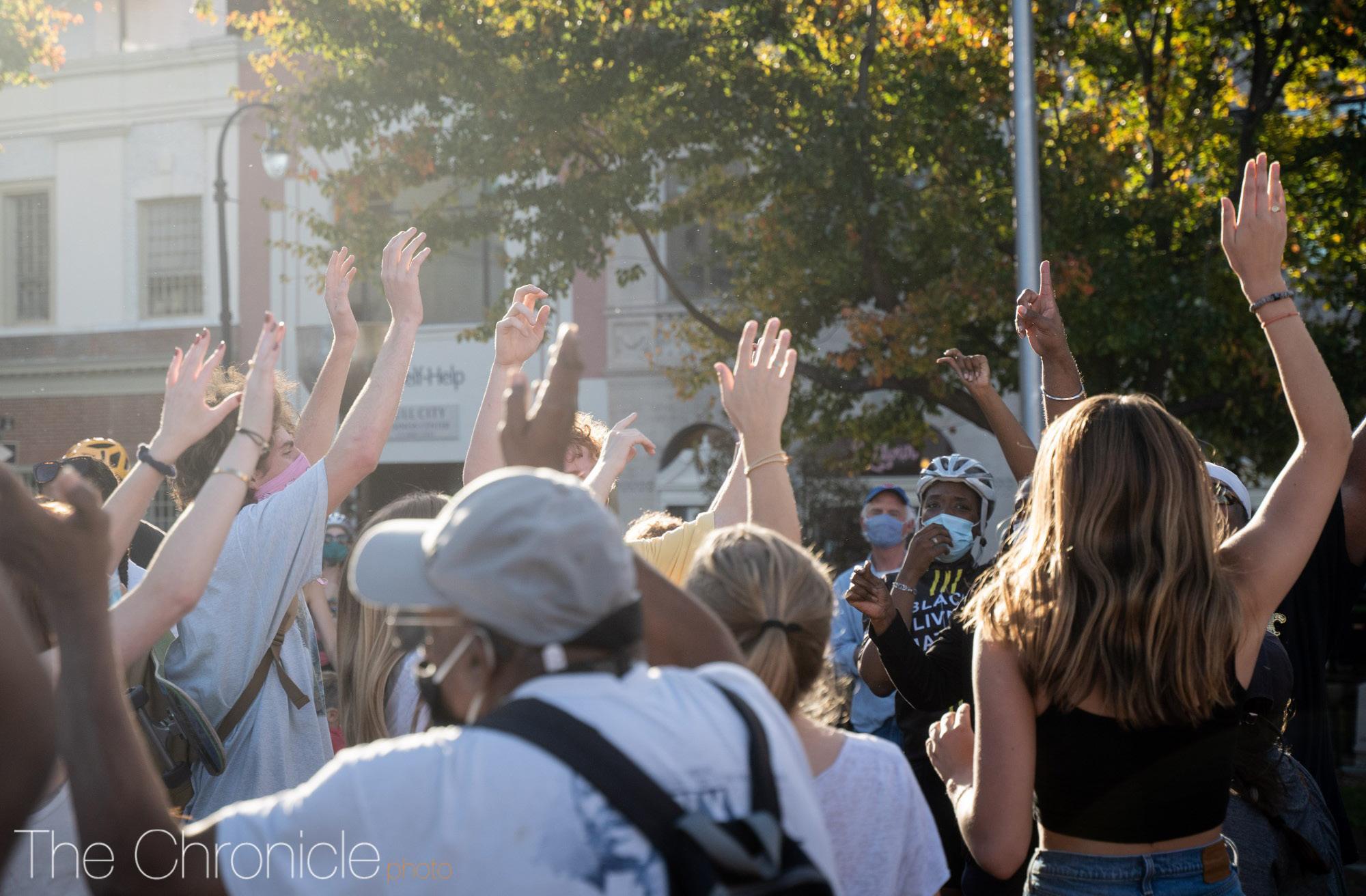
To Keesecker, the whole thing was a great prank.
“There’s something funny to me about being behind the scenes, causing a ruckus without ever being identified,” he said. Until an email newsletter to Duke faculty blew his cover, he intended to remain strictly anonymous.
Keesecker released the song on Spotify and Apple Music on popular demand, again under the MicrOpaqu3 pseudonym.
On Oct. 12, first-year Sam Carpenter had just left his international relations class in the Bryan Center when a drawing of a red keytar drew him to a Chronicle newsstand. Paper in hand, he watched Duke librarian Jamie Keesecker’s “Library Takeout” video, featured in a story on the front page, and posted it to Reddit.
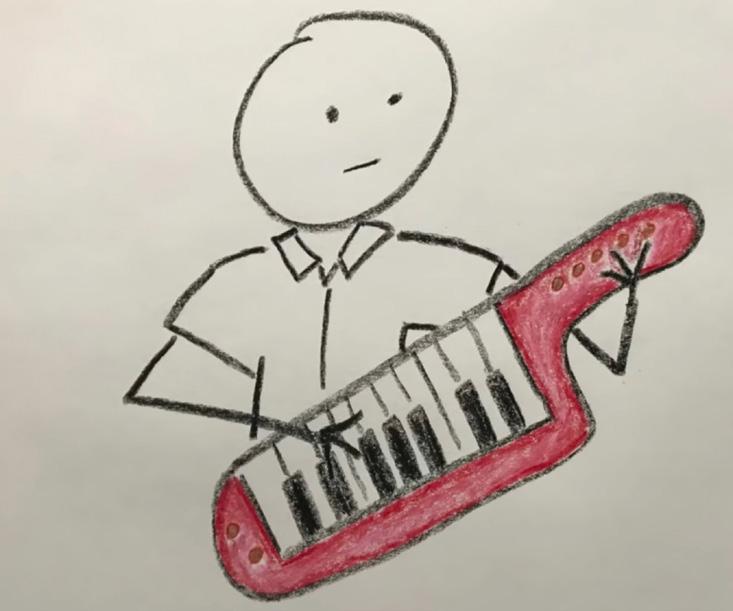

By the end of the day, Carpenter’s post had soared to the front page of Reddit. “Library Takeout” went from around 20,000 views to more than 400,000 on YouTube. As of early Tuesday, its view count was more than 784,000. The official Spotify account tweeted a link to the song, calling it the “greatest library-focused track ever made.” Keesecker’s hit now has almost 100,000 streams on Spotify.
“Being on the front page of Reddit is like — it’s hard to think of a higher honor… It’s kind of like the Billboard Top 10 of DIY-ers,” Keesecker said. Keesecker’s video inspired comparisons to
YouTubers Bill Wurtz and Louis Cole in the rapidly growing comment sections, even prompting one fan to post a drum jam tribute to the song.
Keesecker said he was most thrilled that his video seems to have inspired others to start creative projects. He’s also glad he can close the laptop on his internet fame and spend time on yard work outside.
He goes into work in the Music Library a few days a week now, back in his office with colorful bookbinding samples and book jackets taped to the walls. Naima attends outdoor preschool in a mask.
Keesecker spoke to a friend and fellow composer to express some of his doubts about continuing to compose.
“Does the world really need more music from an almost middle-aged white guy? Don’t we have a lot of this?” he said.
But the friend reminded him to not forget about the other side of things — making music for himself.
Other librarians have approached Keesecker with ideas for more music videos, but he believes in taking breaks between projects to grow as a person. He’s not pressed by the attention to write “Library Takeout 2.” The fans will have to wait.
Editor’s note: This story has been edited and condensed for print.



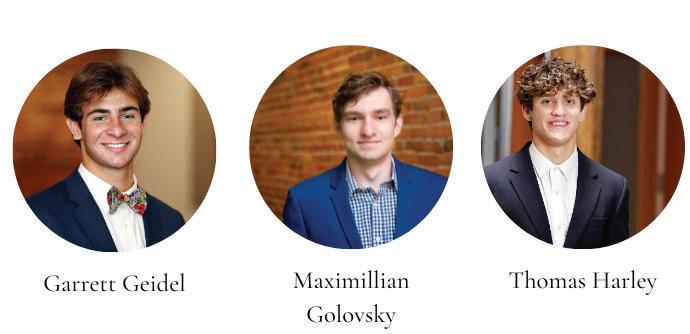

Lilly Library
Hailey Batista
Brandon Lauer, M.P.P.

Emma Lofgren
Kari Nimox
Celine Wei
Music Library
Courtney Dantzler
Cierra Harrison
Rubenstein Library
Tess Foote
Sarah Kelso
Ricardo Mendez
Jessica Orzulak, Ph.D.
Maddie Stambler, M.F.A.
Neha Vangipurapu
Charles G. Watson, M.F.A.
Lisa Zhao
Ford Library
Tyler Chisolm, M.S.
Christina Hershey, M.Div.
Craig Glover Hines, M.Div.
Kaitlynne Janes
Jacob Lancaster, M.Div.
Nikita Schwartzman, M.A.
Tomo Shiotani Waters, M.Div.

Divinity Library

Bri Higa, M.Div.
Ruth Ostler, M.Div.
Jimin Park, M.T.S
Anita Salazar, M.Div.
Jackson Shepard, M.T.S
Erin Shiflett, M.Div.

Launa Steward, M.Div.
C. J. Surbaugh, M.T.S
Medical Center Library
Kruti Desai, M.S.

Tina Vij, M.E.M
Goodson Law Library
Monica Calce, J.D.
Biniam Garomsa
Jonice Jackson
Eunjung Lee, M.Eng.
Daman Papneja, M.Q.M.
Apoorva Shankar, M.Q.M
Hannah Schofield, M.E.M.
Perkins & Bostock Libraries
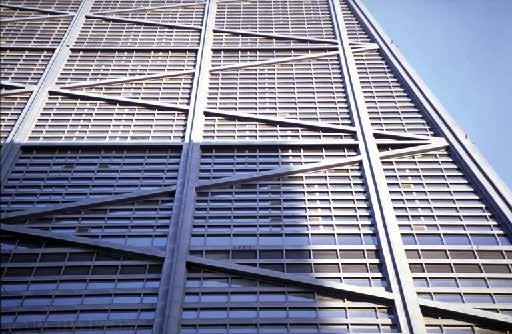
and Smith Warehouse
Lou Bennett, M.F.A.
Quinn Bulkeley, M.A.
SiChang Chen, M.A.

Shidi Dai, M.P.P.
Sam Dilley
Ruisi Fang, M.A.
Bailey Hardy, M.Div.
E. K. Hayes, M.A.L.S.
Huanqiu Hu, M.A.
Nour Kanaan
Yan Liu, M.A.
Vladimir Lukin, Ph.D.
Vann Powell, M.F.A.
Audrey Siqi Liu, Ph.D.

Junior year saw a near return to normalcy, sweeping changes to the housing system and an unforgettable basketball season.
The first day of classes was filled with excitement and anticipation as a fully-populated student body flooded quads and lecture halls for the first time in two years. This was shortlived — in response to over 300 undergraduates testing positive for COVID-19 in late August, Duke allowed professors to move classes back online for two weeks.
Student groups did their best to adjust to new safety protocols but found it difficult to plan recruitment. NonGreek selective living groups were not given any new fall rush guidelines, while Duke Interfraternity Council recruitment was a hybrid of in-person and virtual events.
In mid-September, Duke announced QuadEx, a new residential system that links East and West Campus quads, to begin fall 2022. The goal of QuadEx is to emphasize a longer period of time for incoming students to build connections within their residential communities, but students had mixed opinions about this housing change.
The Class of 2020 reunited on campus for a weekend to celebrate a belated commencement, with Sabrina Maciariello, Trinity ‘20, as the student commencement speaker and Ken Jeong, Trinity ‘90, as the guest commencement speaker. The alumni received closure from the abrupt end to their college career two years ago.
And in early October, North Carolina held its primary elections, in which only 10.18% of registered voters in Durham County cast ballots in the primaries. Elaine O’Neal was elected as the first Black female Durham mayor in November, and in April, she delivered her first State of the City Address.
Duke Athletics saw major transitions in leadership in the summer and fall. In a surprise June announcement that rocked the sports world, now-former head coach Mike Krzyzewski revealed his plans to retire after the 2021-2022 season, with Jon Scheyer named head coach-in-waiting. Nina King took over for Kevin White as athletic director at the start of September, while longtime football head coach David Cutcliffe departed at the season’s end,
making way for new head coach Mike Elko to come to Durham.
Duke Athletics wasn’t the only area of the University to see changes in employment. In December, students and faculty protested against the changes to the Thompson Writing Program, in which renewable contracts will replace non-renewable lecturing fellowships as they expire. In February, the Duke University Press Workers Union won its election to unionize.
New faculty, programs and centers were also announced, with the Trinity College of Arts and Sciences concluding a cluster hire in Native American and Indigenous Studies in August. The Arts and Sciences Council approved the Asian American and Diaspora Studies minor in February. Duke announced in April that it would establish the Center for Gender Violence Prevention and Intervention in fall 2022.
The University saw some positive trends with Duke’s finances. Duke’s endowment returned nearly 56% in fiscal year 2021. Duke received an $11 million donation from an anonymous alumni family, the majority of the gift going towards the Sanford School of Public Policy. Duke also announced that it will be raising the minimum wage to $17 per hour for all eligible employees, with work-study positions rising to a minimum wage of $15 per hour.
Still, the year was not without unfavorable incidents, especially in dorms. Students reported theft and vandalism in Kilgo Quad laundry rooms, and Few Quad residents dealt with broken exit signs and multiple fires.
Duke also had its fair share of controversies. In January, former Duke doctoral student Matthew Harris sent a video referencing a mass shooting and an 800-page manifesto threatening members of the philosophy department at the University of California, Los Angeles. Duke was also one of 16 universities sued for alleged antitrust violations regarding unfairly limiting financial aid.
The Duke community mourned the losses of some of its members this year. Michael Ward, professor emeritus of political science, died in July. Sally McIntosh Ziegler, Trinity ‘56 and the first female editor-in-chief of The Chronicle, died in September. Professor of History Elizabeth Clark also died in September. Sophomore Bryan Lopez died in December. Paul
Farmer, Trinity ‘82, died in February.
In November, a person unaffiliated with Duke was found dead in a wooded area near Penn Pavilion.
In March, following Russia’s invasion of Ukraine, Ukrainian and Russian students reflected on how the war was affecting their lives in Durham and their families in their home countries.
Two Duke administrators announced their leave this year. Vice President for Administration Kyle Cavanaugh will retire this September and will be the National Basketball Association’s new President of Administration. Trinity College Dean Valerie Ashby will leave Duke in June and will begin her role as president of University of Maryland, Baltimore County in August.
And back to Duke Athletics — women’s basketball fell to Miami in the ACC tournament and ultimately missed out on the NCAA tournament in Head Coach Kara Lawson’s first full year, but Shayeann Day-Wilson won ACC Freshman of the Year. While women’s golf could not defend their ACC title, Phoebe Brinker and Erica Shepherd took first and second place in the championship individually. For the first time in a decade, Duke women’s tennis won the ACC Championship.
But of course, Duke men’s basketball was at the center of the college basketball universe this year. The Cameron Crazies were back in the stands and tenting in Krzyzewskiville.
The team won its first ACC regular-season championship since 2010 but could not fend off Carolina in Coach K’s last home game. The Blue Devils had a magical run in San Francisco, winning the West regional tournament, but lost again to Carolina in the Final Four in New Orleans, officially ending Krzyzewski’s career.
After an electric basketball season came the end of the semester, which was filled with festivities.
In the year’s student elections, undergraduate students chose junior Lana Gesinsky to be the next DSG president, replacing senior Christina Wang. Senior Kacia Anderson was elected to serve as undergraduate Young Trustee. And on the first inperson last day of classes in two years, students celebrated with a live concert featuring A$AP Ferg, Daya and Peach Tree Rascals.
Duke will be rolling out a plan for a transition to a residential college system to begin fall 2022 over the next few days.
The plan is built around “a strong affiliation for students’ first-year homes and their sophomore year quad, with recruitment for Greek life and other selective living groups continuing in the fall of prospective recruits’ sophomore year,” according to an email obtained by The Chronicle from Mary Pat McMahon, vice provost and vice president of student affairs, Shruti Desai, associate vice president of student affairs for campus life and Chris Rossi, assistant vice president of student affairs.
The email states that the 2022-23 academic year will be the last year that selective living groups will have a dedicated residential section in campus housing.
“We are not ‘abolishing’ Greek life and have no plans to do so; we are, however, going to continue to emphasize a longer period of time in which incoming students focus on broadening their connections and affirmations within their residential communities,” the email reads.
The residential model will be centered around residential quads with their “own identity, traditions and social events,” similar to other private universities. “Initial implementation of some elements” is underway this semester, and the system will be fully operational in fall 2022.
First-years will continue to live on East, and beginning with the Class of 2025, one to two East Campus houses will be assigned to one of seven quads on West Campus. Students cannot pick their quads. This is similar to the automated linking system that was established in spring 2020, but linking is now mandatory. The University will announce further details about linking this semester, according to the QuadEx FAQ.
Current first-years will learn their assigned quad in spring 2022, and the Class of 2026 and following classes will learn their assigned East Campus and West Campus residences prior to move-in.
Students will still be able to rush selective living groups and Greek organizations, but selective housing will be phased out after the 2022-23 academic year.
Senior Christina Wang, president of Duke Student Government, wrote that QuadEx “plans to preserve and foster the experience of LLCs, FOCUS groups, and academicrelated groups.”
“Quads will offer belonging, friendship, and continuity in the transition from East to West Campus, throughout their time at Duke, and well after graduation,” the website reads.
Students are allowed to select their roommates and request to block with friends, but all members of a block must be in the same Quad.
Students will live in their assigned quad in sophomore year but will still “retain affiliation with their quads” if they choose to live elsewhere after their sophomore year. Approximately 125 beds will be reserved for upperclass students in each quad.
Juniors may live in their assigned quad or other upperclass housing on West, including Hollows Quad and 300 Swift. Seniors may live in any of these locations or off campus.
Wang wrote that the reason that Hollows isn’t part of the quad system is “a result of its different housing style (suite-style living).”
“Additionally, the goal of the Quad program is to build community in shared spaces such as the Gothics and more closely grouped Quads, making the Hollows less ideal as a community-building space for sophomores/juniors,” Wang added.
Beginning in fall 2022, first-years will partake in a quad-based house course called “Duke-Durham 101,” which aims to prepare students for “good citizenship” at the University and in the surrounding community. Sophomores will participate in “Sophomore Spark,” which will provide academic and career programming and alumni networking opportunities.
Quads will also be assigned Faculty Affiliates, who will provide mentorship and support quad traditions without the residential component.
The planning for QuadEx began in 2018 with the launch of the Next Generation Living and Learning Experience task force, according to its FAQ page. Recommendations made by the second iteration of the committee shaped the current model, which will be rolled out at a later date as the University works out some of the logistics.
McMahon told The Chronicle Tuesday that Duke is still working through more logistics of QuadEx. She estimates that they will formally roll out the full plan the last week of September.
Why the change?
Senior Ysanne Spence, president of Duke University Union, wrote that Duke has been a “near-explosion of selectivity, gate-keeping and imposter syndrome” in her experience. To Spence, QuadEx is an opportunity to “take the guess work” out of the social scene at Duke.
“Coupled with the fact that students just got accepted into an institution with a 4% acceptance rate, students are then thrusted into applications and gate-keeping of social and professional events and developments,” she wrote.
Wang agreed, citing a “need for more inclusive spaces and community-building opportunities for all students, especially those who choose not to join selective social organizations (and even for those who do choose to join selective social organizations).”
Wang wrote that “administrators’ intentions are not to restrict the student experience, but rather to expand it.”
“I think a misconception that many students have is that administrators are attempting to limit student freedoms and create restrictions around what students can and can-
February 1, 2022
Droves of Duke fans shuffle to Cameron Indoor Stadium on a recent Tuesday night to watch their Blue Devils take on Clemson.
Everything is nearly identical to all the other home games from this season. Line monitors’ bull horns ring, students show off their homemade signs to friends and the pregame line gradually grows as everyone scurries toward the walkway alongside the Wilson Recreation Center.
But something gives Krzyzewskiville a different look. Probably the 200+ tents filling up every square foot of grass.
Normally students hang out on the grassy quads prior to the games doing everything from painting faces to making hype videos on the Duke University Students’ Instagram page. But there wasn’t much space to do that starting Jan. 23, when the annual tradition of tenting returned after the pandemic forced its cancelation in the 2020-21 season.

Students were ready for it to be back.
“Tenting is just very special. You’ll meet so many new people. The community is unparalleled,” said senior Nitin Subramanian, who also tented his freshman and sophomore years. “Last night, I hung out with 10 people I’ve never met before at Duke.”
The return of Krzyzewskiville
It did not always look like tenting would get to make its return during the 2021-22 season. Over Duke’s winter break Dec. 23, the University canceled the normal Black tenting period (the longest one) due to concerns over the Omicron variant, with plans for students to set up camp for Blue tenting (the shorter phase with less required people in tents) starting Jan. 16. Weeks later, the University pushed back the tenting start date again as it decided to also hold classes online until Jan. 18. After much anticipation, the University gave tenting the go-ahead Jan. 13, with the plan for the infamous entry test to be Jan. 19 and Blue tenting to begin Jan. 23.
“I was pretty upset when we got the first email about Black tenting being canceled and then when it got pushed back again that also wasn’t great,” junior Elizabeth Wise said. “We were worried that it wasn’t gonna happen or something but I was like: ‘Stop saying that, we need to make it happen, don’t jinx it.’”
Wise’s group and 169 others had their wish granted. Roughly one-third of the undergraduate student body huddled in Cameron Indoor Stadium to take the test, and the 70 top scores emerged victorious — with real estate in Krzyzewskiville as their reward.
Additionally, the setup process was different this year to adjust for the Omicron surge. Instead of each group having one large tent with all the members sleeping in it, there is a rule of two people per tent. That makes living arrangements a little difficult with the six-person nightly requirement in Krzyzewskiville during Blue tenting, but Duke Athletics provided two additional tents to each group.
“I think it’s definitely more of a hassle just because it’s more setup, more tarps, more stakes you got to put down but I think it’s
definitely more comfortable in terms of the living situation,” Subramanian said.
After a full day of hammering stakes, laying out pallets and propping up tents, Krzyzewskiville was back to its former glory by nightfall of Jan. 23.
‘This is actually my school’
For the hundreds of students braving the cold until the March 5 North Carolina game, it’s all worth it, especially after a year of being “Cameron-deprived” as senior Sunrita Gupta called it.
Gupta values the skills that she’s learned from tenting. Negotiating pallet prices with local businesses, setting up a tent and collaborating with teammates are all things she’s picked up.
“This has taught me a lot more than a lot of other extracurriculars I’ve been in,” Gupta said. “I think that this is a super worthwhile experience as long as you’re good about the time management and are willing to sacrifice some other things for it.”
For others, tenting was just written in their future since birth.
“There’s photos of me wearing Duke gear at like three months old so it was always gonna happen,” sophomore Thomsen Hoops said. “I’ve loved Duke basketball since I was a little kid.”
Hoops’ tenting teammate, sophomore Skylar Brogan, knew she wanted to tent after she watched a documentary on the Cameron Crazies and the rivalry while she was applying to colleges. She knew she had to be one of the fans in the stands painted blue.
“When I was interviewing [during the college application process], I was like: ‘I want to go to Duke because I want to paint myself blue.’”
Regardless of what people’s biggest takeaway from tenting is, many students circled back to the feeling of community that tenting in Krzyzewskiville creates.
Wise is the proud team captain of “Keels Kave” and she’s enjoyed being in a tent with her friends from various social groups. Gupta is a part-time student this semester and being in “K-Watch” (like the 2017 remake of Baywatch) has kept her connected to campus.
“It’s so cool to walk around campus, see the players around, actually be friends with some of them and be like: ‘Oh this is actually my school,’” freshman Amy Fulton said. “I feel such a sense of commitment to the team now, I gotta be there. I gotta support my boys.”
As much time and effort as tenting in Krzyzewskiville takes, the students know how to have fun while doing it.
Fulton and her group hung inflatable fish, crabs and strings of fish lights across their tent’s entryway to go along with its “Margaritaville” name. Wise and her friend adopted Mardell the stuffed dinosaur, a name the two of them made up because Wise’s favorite player is Mark Williams and her friend’s favorite is Wendell Moore Jr.
Looking across Krzyzewskiville, a lot of the students in the tents weren’t even on campus the last time tenting took place. This season is different than any other with the raised stakes that Coach K’s last year puts on it. Only four of the players on this team’s roster had even known what it was like to play in a packed Cameron Indoor Stadium before this year.
But that defining characteristic of the students who pack Cameron Indoor Stadium is the same as it always was.
“We’re still crazy,” Wise said.
Abele Quad, 7:30 a.m.
Abele Quad was empty on Monday morning, but within the dorms, thousands of students were waking up and preparing for their first day of class, ready to breathe life into a campus that had been under strict pandemic restrictions for almost two years.
A door in Craven Quad swung open, revealing several residential assistants carrying foldable tables, boxes of food and crates of juice to set up breakfast for their residents. Students gradually formed a line to get their share of Bojangles biscuits and Krispy Kreme donuts.
Sophomore Luis Graterol grabbed a biscuit on his way to his first class of the day, a differential equations course. He was grateful that Duke is hosting in-person events like the breakfast.
“Last year was kind of like a half year in terms of the amount of stuff we could do,” Graterol said. “So seeing all these people outside and having a good time is a different experience.”
Graterol took a bite out of his biscuit. “Wait, I thought I got egg and cheese! Why is there bacon?” he said. Confused, he checked the label. “Oh, well, I just can’t read. This semester is going to go great,” he joked.
But in all seriousness, Graterol said he’s ready for this semester. “I’m ready to go into whatever’s happening,” he said.
Lines of hungry students packed the Brodhead Center as the building hummed with the sounds of chattering students
and clinking silverware. Aside from people wearing masks, this lunchtime scene felt close to normal.
Upstairs on the second floor, several Duke Kunshan University juniors sat around fluffy gray couches, enjoying their meal. Junior Aryaman Babber said he feels more like a firstyear at Duke than a junior.
“We don’t know where anything is!” he said.
Junior Jingcheng Wu nodded.
“I was looking for my classroom yesterday, and I actually ran into a bunch of [first-years]. They also thought I was a [firstyear] because I was looking for the class,” Wu said.
Just outside the Brodhead Center, Duke Student Government President Christina Wang and Duke University Union President Ysanne Spence, both seniors, chatted with first-years they had befriended through Project BUILD.
Wang called this FDOC “bittersweet.”
“It’s their first, our last,” she said. “It’s nice seeing everyone back on campus. It feels almost like a normal FDOC.”
East Campus, 12:30 p.m.
Over at East Union, students trickled in and out for COVID-19 tests. In the lobby, a photo booth for the first day of classes featured a blue backdrop embellished with Duke logos. Props lined a black table — glitter fedora hats, pom poms and a foam sign.
Downstairs in Trinity Cafe, employee Renata Spain-Steele agreed with Wellman’s assessment of the first-years.
“They seem to be a little more at ease [than the Class of 2024 was] with most of the restrictions lifted,” she said.
For Spain-Steele, the day was busy, but she didn’t mind. After a slow summer, she welcomed the fast pace and new faces. Taking care of first-years means explaining to them how equivalency works, telling them, politely, that there can only be four people at a table and offering them her support.
“Some [first-years] have told me that they cried when their parents left, and I try to reassure them that everyone here is nice and if they have any problems or questions, just come to us,” she said.
Bryan Center Plaza, 2:15 p.m
In the humidity of the afternoon, the Bryan Center Plaza was packed with students doing work and eating a late lunch.
Seniors Kaela Basmajian and Jonathan Suna sat at a green table laughing with each other and enjoying Tandoor and Sazón between their classes. But getting their food had not been easy.
“[The Brodhead Center] was just a disaster,” Suna said. “I’ve never seen a line that long in my entire life. I made friends in line, the line was so long. But it was fun.”
Basmajian and Suna were people watching from their spot on the plaza. Basmajian said that they’ve seen a lot of friends so far, including a group of guys in black graduation robes walking around while making noise.
“We think it might have been a secret society,” Suna said. “They were doing weird arm things.”
“They didn’t talk to us, they just screamed randomly,” Basmajian said. “We didn’t really know what was going on, we just enjoyed the show.”
Editor’s note: This story has been edited and condensed for print.
Senior year was one of new beginnings — a year marked by the implementation of QuadEx, the first seasons of two head coaches and the lifting of COVID-19 protocols that defined much of the Class of 2023’s Duke experience.
Duke made national headlines this year. Following the Class of 2022’s graduation, The Chronicle reported that the student commencement speech closely resembled a 2014 Harvard student address. In late August, Duke volleyball player Rachel Richardson reported that she was “racially heckled” during a game at Brigham Young University. The incident resulted in the banning, then unbanning of a fan after the school’s investigation did not find evidence of racial slurs directed at Richardson.
The University implemented the QuadEx residential program in the fall of 2022, which saw the introduction of Faculty Fellows and the creation of Quad Arches. The Class of 2026 was the first to experience Experiential Orientation, another QuadEx program, which marked an overhaul in orientation programming that cost $1 million more than the traditional Orientation Week experience. The Chronicle spoke with alumni who advocated for housing reform and examined the differences between QuadEx and other peer institutions’ residential systems.
At the same time, students — the Class of 2026 and upperclassmen alike — had mixed reactions to the new housing system. Under QuadEx’s “all-gender housing model,” the Baldwin Scholars lost their female-only section. The future of selective living groups on campus remains uncertain. Some chapters of Duke-affiliated Greek life are still recovering from the effects of the COVID-19 pandemic while adjusting to QuadEx, and non-Greek SLGs received conflicting messages from the administration regarding recruitment.
The University slowly removed COVID-19 protocols that had become a part of campus life. By late September, masks in classrooms were no longer required. By March, masks on buses were no longer required. In April, Duke ended its COVID-19 vaccine requirement for most students, faculty and staff.
As a monumental midterm election season came and went, The Chronicle spoke with candidates, voters, and journalists before, during and after Election Day. After all the votes were tallied, the Republican Party fell just one seat in the North Carolina Senate
short of a supermajority in both General Assembly chambers. In April, North Carolina state Rep. Tricia Cotham changed her party affiliation, shifting the supermajority in the Republican Party’s favor.
In December, Duke accepted 800 Early Decision applicants, making the 16.5% acceptance rate the lowest in Duke’s history. Duke admitted 4.8% of its Regular Decision applicants in March.
Senior year saw a new dawn for football culture. Under the leadership of new head coach Mike Elko, the ACC Coach of the Year, the Blue Devils ended the regular season 8-4 and defied expectations to become Military Bowl Champions.
In December, line monitors announced a pilot program providing financial aid through tenting supplies. Cameron Indoor Stadium was packed once again, the Blue Devils went undefeated at home and Duke completed a sweep of North Carolina after losing to the Tar Heels in the Final Four last year. And despite early road struggles and a controversial no-call against Virginia, the Blue Devils rallied to win the ACC tournament before losing in the second round of the NCAA tournament.
Women’s basketball enjoyed a special season of its own, falling just short of the ACC regular-season title and earning a No. 3-seed for the NCAA tournament. Men’s lacrosse won the 2023 ACC title after defeating Syracuse in the Blue Devils’ conference finale. Men’s tennis is in the NCAA Sweet 16 for the first time since 2015 after achieving its best-ever ACC record.
Duke Athletics wasn’t the only part of Duke that experienced a changing of the guard. Gary Bennett, vice provost for undergraduate education, was named the next dean of Trinity College. Provost Sally Kornbluth was named the next president of the Massachusetts Institute of Technology and will be replaced by Alec Gallimore. Suzanne Barbour joined the Graduate School as its new dean in September.
Duke also saw several losses. Samar Zora, a fourth-year doctoral candidate in the cultural anthropology department, passed away in February. Peter Nicholas, the Nicholas School of the Environment’s namesake, passed in June. John Burness, former senior vice president for public affairs and government relations, passed in December. Basketball and baseball legend Dick Groat passed in April. Beloved campus pets Nugget and Peaches died over the summer.
As the Bryan Center prepares for renovations that could cost up to $110 million, cultural and identity groups are asking for more equitable space allocations for their organizations. As student groups shared their grievances and sought solutions, the Center for Multicultural Affairs celebrated its 50th anniversary and held its first multicultural graduation.
Campus labor unions saw major developments this year. In August, the Duke University Press Workers Union officially won its union. The Duke Graduate Students Union filed for an election with the National Labor Relations Board in March after launching a campaign for formal recognition in September. In response, the University is challenging a 2016 NLRB decision affirming the legal right for graduate students to unionize.
This was a big year for climate activism on campus. Duke announced its Climate Commitment, which aims to increase the role of the University in tackling the climate crisis. The Undergraduate Environmental Union — a subcommittee within Duke Student Government — voiced that they believed the Climate Commitment does not go far enough and called for more student input.
At the same time, several Duke centers and affiliates have struggled. Duke Student Affairs saw a series of staffing shortages, hampering student group funding and planning for cultural events. The Center for Documentary Studies, a nonprofit affiliate of Duke, has undergone a programmatic overhaul over the past year. A year after the establishment of the Center for Gender Violence Prevention and Intervention, the Center still lacks a permanent director.
On the academic side, Duke’s Asian American Diaspora Studies minor saw its first year, while the School of Medicine and the School of Law announced that they would withdraw from US News and World Report’s rankings in January. The Curriculum Development Committee also began thinking about what Trinity College’s new curriculum will look like.
Undergraduates chose junior Isaiah Hamilton to be the next DSG president, while senior Sydney Hunt was chosen as the next Undergraduate Young Trustee nominee. Seniors Shreyas Hallur and Qi Xuan Khoo were named Rhodes Scholars.
“What do we want? Climate justice! When do we want it? Now!”
These chants from Duke Climate Coalition’s protest for fossil fuel divestment echoed across Bryan Center Plaza Thursday afternoon, where students and supporters gathered to demonstrate substantial student support for Duke to divest from fossil fuels.

The protest began with a speech by DCC Co-President Brennan McDonald, a senior. McDonald said that students need to stop supporting Duke’s “unrealistic business-as-usual model that has landed us in a planet wide crisis and start investing in a livable future.”
“The Duke administration has continued to reject divestment. This is a clear violation of the University’s research and education mission and directly contradicts the contributions of Duke faculty to climate sciences and environmental activism,” he said.
In September, Duke announced a Climate Commitment supported by $36 million in initial gifts. The commitment lays out four areas of focus: energy transformation, climate and community resilience, environmental and climate justice and data-driven climate solutions. The commitment does not include a plan to divest from fossil fuels.
“We are excited to see this [Climate Commitment as a] positive step forward. However, we find it is utterly hypocritical of Duke to call itself a leader in the climate action space while it is still financially benefiting from some of the most polluting companies on the planet. Duke cannot have it both ways,” McDonald said.
According to the Duke Student Government divestment referendum first proposed in February, DCC estimates that 1-2% of Duke’s endowment is invested in fossil fuels, equating to about $127-254 million in assets.
Nearly 90% of students who voted were in favor of divestment during the March DSG elections. However, Duke administration has not taken any action, according to McDonald.
“[The protest] is a visual representation of how students are feeling right now. Our voices need to be heard in the process of climate action,” McDonald said.
The push for divestment at Duke began back in 2012 with phone banking, petitions and protests. The movement is part of a larger trend at many other peer institutions. Georgetown, Oxford, Brown, Cornell, Dartmouth and Harvard have all divested from fossil fuels.
“If Duke doesn’t want to be left behind, they need to start working on it,” McDonald said.
Grace Jennings, a Duke senior and DCC co-president, hopes that the protest will garner more support among the student body and spread general awareness.
“We hope that if somebody brings up divestment in conversation, Duke students will be able to say, ‘Oh, I’ve heard something about that,’” she said.
McDonald said that the University does not disclose specific financial investments, which poses a challenge for students advocating for divestment.
The “[administration] has refused to tell us anything about what Duke has invested its money in. Without that, we can’t have good-faith efforts to have a conversation about these issues ... And, so once we’re on the same page and we have access to information about Duke’s exposure to fossil fuel companies and the endowment, I think that will be a really strong basis for productive conversations,” McDonald said.
The Chronicle reached out to Chris Simmons, interim vice president for public affairs and government relations, for comment, who responded with a link to Duke’s public financial reports and statements, which are posted for fiscal years 2001-02 to 2021-22.
As QuadEx’s inaugural year comes to an end, The Chronicle returned to the students who shared their initial reactions to the new residential living system with us in 2021.
The articles, titled “‘We haven’t gotten the chance to develop a so-called Duke norm’: Students talk new QuadEx system,” and “‘People should have a choice of the identity that they want to create here’: How first-year students feel about QuadEx,” were published days after The Chronicle reported that Duke would be rolling out QuadEx. At the time, many first-years felt overwhelmed about being thrown into a new system. Upperclassmen pointed out its restricting features and questioned the draw of quad events, but identified QuadEx’s potential to build a more inclusive Duke community.
This year, though students’ thoughts on QuadEx as a system varied, they still tended to agree on the fact that it was restricting specific groups, such as non-Greek selective living groups, from finding community on campus. They also pointed out a lack of tangible change in students’ social habits despite the increased presence of quad-related events.
Sophomore Vibhav Nandagiri expressed uncertainty about QuadEx last year.
“It’s definitely a lot of pressure to be the first class to get these quad communities going. Whether we will embrace that challenge or not is yet to be seen,” Nandagiri said in 2021. “People should have a choice of the identity that they want to create here. It seems like those choices are disappearing.”
Now, as Nandagiri reflects on his first two years at Duke, he has valued joining the selective living group Roundtable in addition to forming close friendships within his Keohane Quad, for which he serves on Quad Council.
“I’m very close with the people in my block, and I generally like them, so I guess in a way, if it weren’t for QuadEx, we wouldn’t
have been together,” Nandagiri said. “So I think it’s fortunate, but I know that my case is definitely not in the majority.”
The Classes of 2023 and 2024 experienced the University’s transition to QuadEx more indirectly, as their first-year dorms were not tied to their sophomore-year living arrangements. However, sophomores last year still spoke about their opinions on QuadEx.
Last year, junior Jack Dugoni, who did not live on East Campus as a first-year due to COVID-19 policies, said, “My first question would be, who did they talk to about this, and where did it come from? … I think that the idea of sticking you with people that you’re pretty much randomly assigned to seems slightly problematic.”
He still feels that the first-year experience varies greatly from person to person, making it difficult to argue that QuadEx would be universally beneficial.
“I think it’ll definitely vary across campus in terms of people that are really satisfied with what they end up with and who they live with. But I think there’s also gonna be a good healthy chunk of people that are not,” Dugoni said recently. “I think it’s a little bit tricky to assume that people are just going to buy into it, that it’s going to work well for everyone.”
As a member of the selective living group Wayne Manor, Dugoni last year said, “I think SLGs should definitely be able to have blocks on campus. That’s kind of what makes them ‘SLGs’ instead of just ‘SGs.’”
He still stands by that, noting that he dislikes the way QuadEx has pushed back on the existence of SLGs, and hopes that two systems can co-exist.
“It’s tricky to justify how SLGs could continue to exist at the same time as QuadEx is taking shape. So I wish that would change. I wish they could somehow do both. But if you can’t provide a living space, at least support their existence because it’s not like you could just wipe SLGs away,” Dugoni said.
Junior Amanda He, who rushed Maxwell House as a sophomore, said in the 2021 article that she was “curious if Duke is trying to slowly do away with SLGs, and Greek life as a byproduct.” However, she did not think they would ever be phased out due to the fact that “Greek life is a big enough community … that it’ll still be here for years and years as long as Duke is allowing it to persist.”
Now, however, she has a slightly more “disheartening” view of the future of SLGs specifically, predicting that in a few years, SLGs will be “completely wiped” and Greek Life will continue to persist.
She agrees with her statement in the 2021 article that Greek life will continue to thrive due to both its current existence as a large community and the fact that students who would have rushed for SLGs will now look to sororities and fraternities for community. However, she foresees a few dangers that might come with restricting SLGs on campus.
“It’s even more harmful to people with specific identities, like those who are LGBTQ+. Those communities will definitely be affected because some of the SLGs on campus have particularly made efforts to welcome those identities,” He said.
See QUADEX RETURN on Page 16
After two years of requiring masks in classrooms, Duke announced that the classroom mask mandate will be lifted next Thursday, Sept. 22. Unvaccinated individuals will also no longer be required to wear masks indoors.
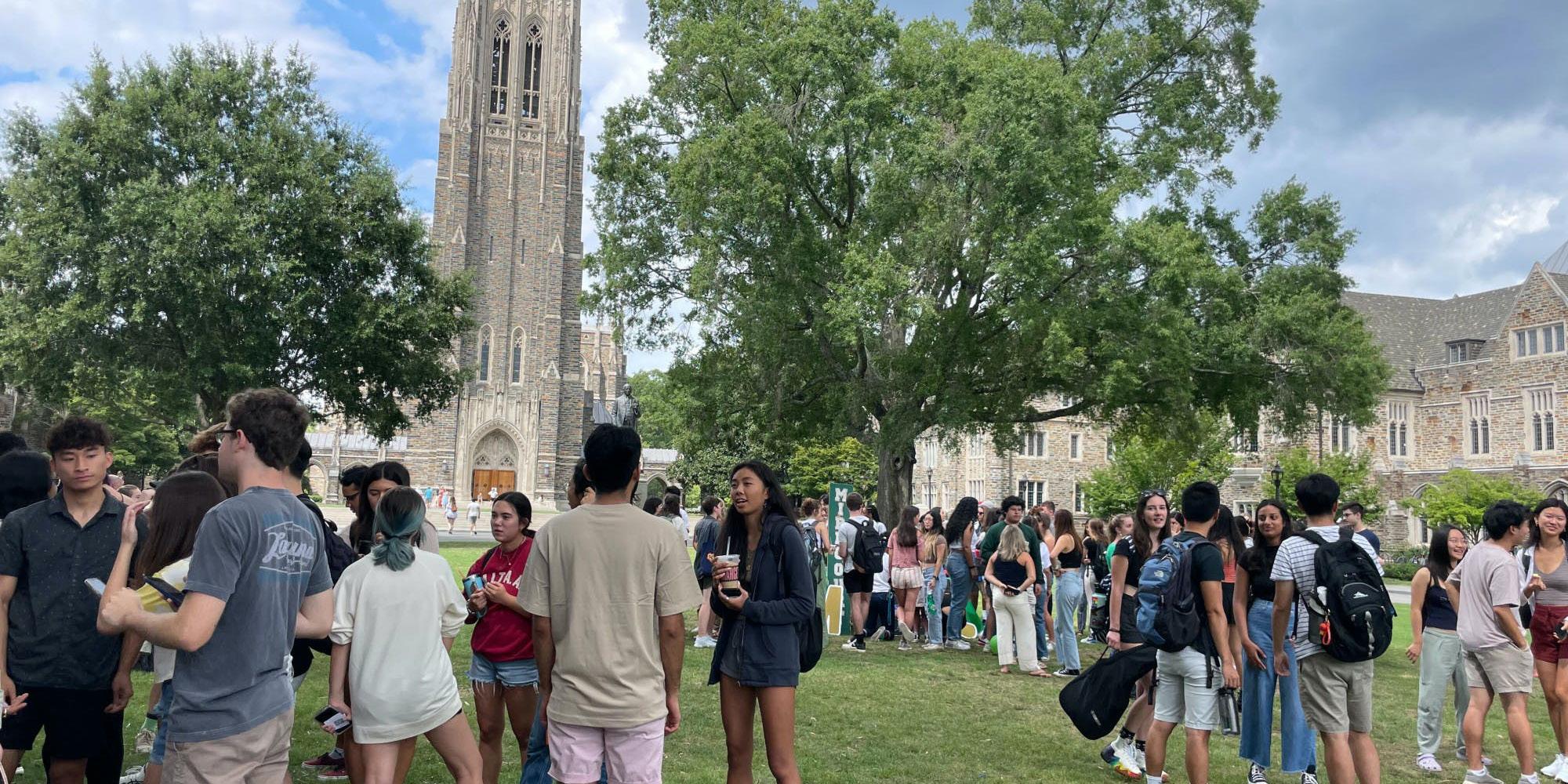
By then, Durham’s community level will have been below the Centers for Disease Control and Prevention’s high-risk category for two consecutive weeks, allowing Duke to “take this next step towards more normalcy on campus and in classrooms,” according to a Friday email sent to the Duke community from Provost Sally Kornbluth and Russell Thompson, interim vice president of operations and emergency coordinator.
Faculty members will be allowed to request that students continue to wear masks in their individual classrooms and “should clearly communicate those expectations to the class” if they wish to do so, the email read.
“Medical experts caution that we are not out of this pandemic yet, and we can expect ongoing variants to emerge that may prove more elusive to vaccines and antibodies and could lead to increases in severe illness and hospitalizations,” the Friday email read. “If so, we must be ready to embrace a return to familiar restrictions and requirements, including indoor masking, that have proven effective in safeguarding our community.”
Although masks are no longer required in classrooms, some professors are still requiring students to wear them, citing health risks due to their age, while others are taking a middle ground.
Berndt Mueller, James B. Duke distinguished professor of physics, is still requiring masks in Physics 142L, General Physics II. A major consideration for him is that he, along with another instructor teaching the class alongside him, are over the age of 65.
“We [are in] the vulnerable age bracket and although we are vaccinated and boosted, we feel it’s an unnecessary risk because quite a few students in our class have come down with COVID,” Mueller said. “So the best thing we can do under these circumstances is that everybody wears masks.”
Campbell Harvey, J. Paul Sticht distinguished professor of international business in the Fuqua School of Business, has been outspoken in the past about the University’s policies regarding COVID-19. In September’s Academic Council meeting, Harvey expressed concern about the accuracy of Duke’s COVID-19 testing data. He has previously advocated for the use of higherquality KN-95 masks in classrooms and long-term solutions like upgrading air filtration systems in classrooms.
But now that Durham is no longer in the high-risk category, Harvey said that he would choose not to mandate masks in class if he were teaching this semester because it makes in-class communication and forming connections with students a lot easier.
Harvey said that he was recently at a conference where a former student approached him. He didn’t recognize who the student was because it was the first time he saw the student without a mask.
“It is very hard to have that kind of personal interaction when you’re looking at eyes,” Harvey said. “I much prefer teaching when people can actually see me rather than just my eyes.”
In Computer Science 230, Discrete Math for Computer Science, Bruce Donald, James B. Duke distinguished professor of computer science, is taking a middle ground. His policy balances the in-class experience of students with health and safety concerns.
Although students must still wear a mask in class, they are welcome to remove it when asking a question because it’s easier to see and hear them, according to Donald. He also allows his students to remove their masks to eat or drink in class.
Donald wrote in an email to The Chronicle that he will
“generally remove [his] mask to make it easier for [students] to see and understand [him] while lecturing.”
“Personally, this is the first time I have taught without a mask in nearly two years so I do find that invigorating,” he wrote.
Harvey said that he understood that “different faculty [members] are in different positions” with their masking policies, due to their age and risk for COVID-19. If Durham were to return to the high-risk category, he would also require students to wear a high-quality mask in classrooms if the policy doesn’t shift back.
He also added that given the six-week length of courses at the Fuqua School of Business where he teaches, it makes sense that professors want to mitigate their risk of missing class due to isolating from COVID-19.
“At the business school, our courses are six weeks long. So if you’re out for a week, or a week and a half, that’s a huge chunk of the course gone,” he said.
Mueller felt similarly about his class, which has both a lecture and a discussion component.
“In a physics class of that type, if you miss two lectures, and maybe one discussion session, you are seriously behind,” he said.
Mueller added that while what students do outside of the classroom is outside of his control, his goal is to “deliver the best and safest service to the students.”
Senior Zach Furie took a contrary view and said that he wasn’t sure how effective the classroom mask requirement was in mitigating the spread of COVID-19 among students, but also understood why professors may choose to implement a policy to protect themselves.
Senior Ronan Tegerdine echoed Furie’s sentiments.
“It seems a little silly to force people to wear masks in lectures while everyone knows that people are going to go to different parties later that night, while we’re all triply vaccinated,” Tegerdine wrote in a message to The Chronicle.
Thomas
2022
‘I just don’t think there is enough momentum to really foster that sense of belonging to a dorm just yet.’Katie Tan Non-Greek selective living groups held a non-recruitment open house Sept 4 after administrators banned SLG recruitment events.
“[The COVID-19 pandemic] definitely negatively impacted my college experience, but I wouldn’t, looking back, say that it ruined it,” Roth said. “I have had two full amazing years that have made up for that year and a half that was really horrible for me, to be honest.”
Towards the future
Despite the effects of the pandemic, seniors pointed to the communities they found and built throughout their time at Duke — “people who have accepted me for me,” according to Roth.

One of senior Lara Bamberger’s favorite memories from her time at Duke was her first performance at a home football game as a member of the Dancing Devils, Duke’s official dance team. As she ran onto the field with fireworks lighting up the sky, she realized “how incredible the Duke spirit and family truly is and how it affected [her] Duke experience so much.”
Sims named the David M. Rubenstein Scholarship Program and the Political Engagement Project Fellowship as two “pivotal highlights” of his Duke experience for allowing him to “make friends and connect with others” with shared experiences.
As work becomes a “big deal” and she lives apart from her friends, Geraci feels how equally “exciting” and “daunting” being apart from her college community might be.
“College is such a unique time,” Geraci said. “It’s not the same when you all live in a dorm, or you live in an apartment building, and you’re doing the same things, and you’re just together all the time, right?”

“If you asked me a week ago, I would tell you I’m not ready to leave at all,” Bamberger said. “I think I’ve come to a place where I’m going to take all the experiences I had at Duke and all the people that have made it so incredible and take them with me.”
Looking back
Seniors expressed that their time at Duke has changed them in ways that leave them as different people than when they arrived.
At the end of his undergraduate years at Duke, Tegerdine feels “a lot more grown up.” His personality and academic interests have changed “for the better,” as he feels that he’s become a “more curious and knowledgeable person than [he] ever could have” before Duke.
Geraci and Roth pointed to how they adapted to the sometimes “overwhelming” pressure at Duke to constantly achieve. Roth noted how “easy” it is to “fall into the idea that you have to do everything all the time.”
“As I’ve gone through my four years, I’ve realized that … I can just be whoever I want to be,” Roth said.
“We all, for better or for worse, hold ourselves to such a high standard,” Sims added. “It’s always easy, especially being here at Duke, to keep your head so much in the books that you lose sight of what’s really important, the friendships that you make along the way.”
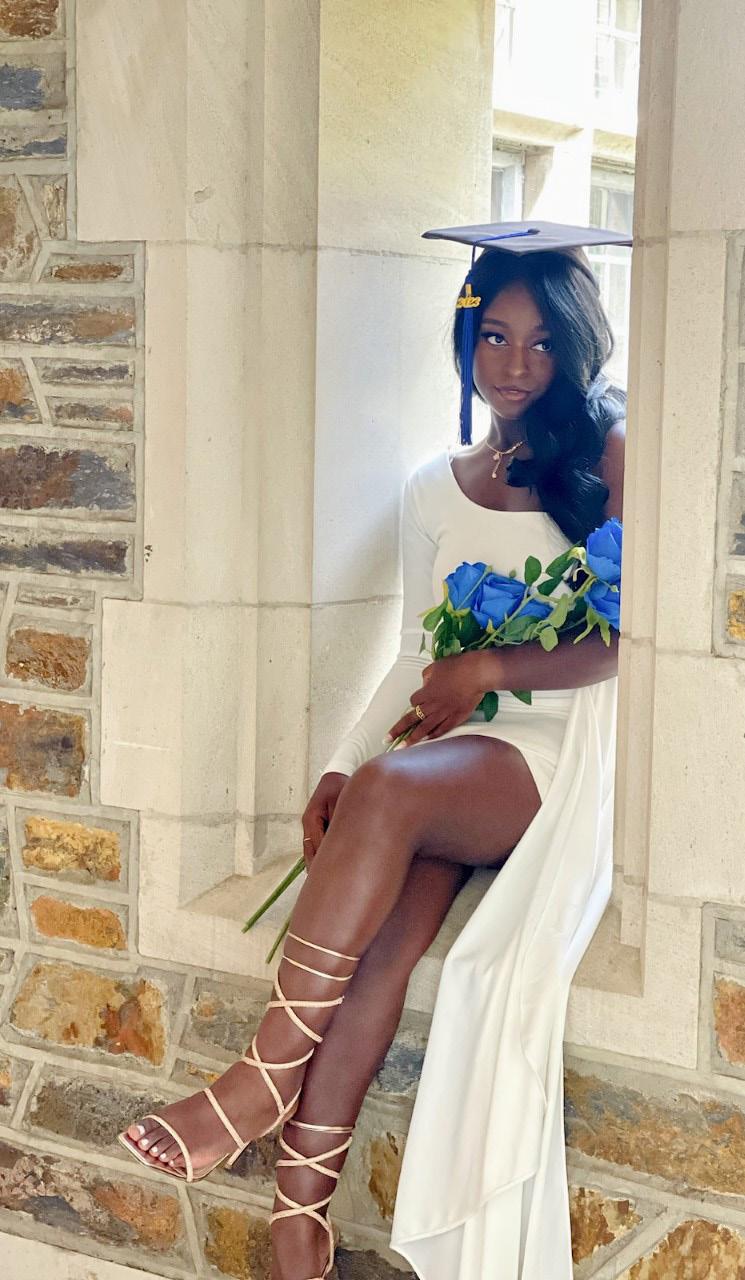
Several seniors expressed mixed feelings about leaving Duke. Geraci feels excited to be an alumna, a part of a “community for [her] entire life.” For her, graduation feels like “it’s time” — but she also doesn’t know “where all the time went.”

“It’s time to say goodbye … It’s bittersweet, but I really enjoyed the experience,” Sims said. “That experience alone is priceless. It’s really priceless.”
FROM PAGE 5
students. He pointed out that the group was growing rapidly: By Friday evening it had 600 members, and by Saturday afternoon more than 800 had joined.
“I’ve seen amazing social media from students,” said Mary Pat McMahon, vice provost/vice president for student affairs.
“You know, certainly sarcastic and processing and all the other things. But I’ve also seen this overwhelming, sort of, let’s pitch in and do this right and be together and think about it.”
Nuzzolillo echoed the sentiment.
“As hokey or as kitschy as it sounds, we are all in this together, and the more that we can help each other the better that we can do,” he said.
FROM PAGE 12
socially, but a large goal behind this program is really to foster inclusivity and community across the board and create a less segmented Duke student experience,” she wrote.
Both Wang and Spence noted that Duke implemented student feedback into the design process of QuadEx. Wang wrote that there were many student focus groups “designed and selected to incorporate the many diverse facets of student spaces and experiences” that were invited to share their opinions about social, academic and residential life at Duke.
Spence wrote that there will be more opportunities in place coming up for students to voice their opinions on quads and the implementation of QuadEx, including giveaways.
FROM PAGE 15
Junior Joy Bao-Dai said in the 2021 article that when it comes to QuadEx, “the one word I immediately think of that describes it is restriction.” At the time, she said that she felt Duke was building more walls between students because “one of the exciting things about entering into sophomore year is that the divide between [first-year] quads is really brought down.”
However, now at the end of her junior year, she noted that her description of “restrictive” may have been a reflection of the pandemic.
“Where you live doesn’t determine who your friends are,” she continued. “A lot of it has to do with your interests, like maybe sports clubs or pre-professional interests. Those are what really determine who you’re friends with. And so, a lot of times it doesn’t have to do with where you even live.”
Bao-Dai shares similar sentiments to Dugoni and He on how “Duke has forced these previously established communities to really break apart” in what she says was a harsh and sudden change with a lot of disregard towards communities people have worked so hard to establish.
“If Duke were to redo QuadEx over again, I wouldn’t be like ‘No, don’t do QuadEx.’ I would be like, ‘Ok, can you implement it in a way that’s more considerate towards the upperclassmen who’ve allowed their entire Duke experience to be shaped by these SLGs?’” Bao-Dai said.
A year later, Bao-Dai has not seen an increase in student engagement with QuadEx despite the events they have been hosting, citing Crowell Quad’s Halloween celebration last October.
Bao-Dai said she was disappointed because the Quad Council had put in a lot of effort, but students stuck to the norm and still showed up to their SLG and Greek life events.
She also has noticed that while Crowell Quad Council has done a great job of using their large budget to plan events and provide free food and merch to the students, she knows of people in other quads who have complained about their Quad Council’s lack of action.
For these specific quads, Bao-Dai said that “QuadEx has essentially not only restricted their communities but also not given them any benefits that QuadEx promised to give.”
“And I feel like largely that falls on the people who are in charge of the funds and in charge of coming up with fun things to do,” she said.
While He believes there is hope for the next Class of 2027 to continue the momentum of forming traditions and fostering inclusion, she thinks “it’s really hard to say right now that there was a change.”
“I just don’t think there is enough momentum to really foster that sense of belonging to a dorm just yet,” she said.
Editor’s note: This story has been edited and condensed for print.
To the Class of 2023:
Four years go by a lot faster than you think they will, don’t they? You’ve seen through all the stages of Duke’s pandemic response, watched countless basketball games and witnessed the birth and inaugural year of QuadEx — and barely in a blink of an eye. If the contents of this paper are any indication, you’ve been very, very busy. Between cramming for tests and writing essays, you’ve been activists, athletes, Rhodes Scholars, DSG senators ... I’d be surprised if you got any sleep.
I hope this year’s commencement issue gives you a brief moment to treasure the countless moments you’ve spent here and celebrate the years to come. We’ve included snapshots from your four years here, your senior reflections and an interview with your commencement speaker, Adam Silver. It wouldn’t be complete without photos of you, whether as a baby or a graduate.
Duke’s a hectic place. It’s an ecosystem full of intricacies and contradictions, and you have been in the midst of the hurricane that is this university at one of its busiest times. So as you hear your name being called on stage, slow down just this once. Hold that moment close to your heart. Take lots of pictures. Cherish the smiles of your loved ones. Hug them as tightly as you can. Remember everything you can and all that you want.
You’ve been busy for quite some time. Take a break.
You’ve earned it.
Best of luck, Audrey Wang, Editor-in-Chief
Now, nearly forty years later, Silver will take the stage at graduation. President Vincent Price announced Silver as this year’s speaker in a video at a men’s basketball game against N.C. State in February. The NBA Commissioner will address the Class of 2023 at their commencement ceremony May 14 at Wallace Wade Stadium.
‘All of three seconds’
Silver learned the news during a call with Price in the fall of last year. When Price said the purpose of the call was to gauge his interest in being the commencement speaker, Silver took “all of three seconds” to say yes.
When asked what he planned to discuss in his commencement address, Silver was reluctant to say, stating that he doesn’t want to “give anything away.” However, he did provide a preview to some ideas he wanted to cover.
“One of the things I would like to focus on is not just the importance of [the graduates’] Duke education, but the role of Durham in shaping their perspective of the country and of the world.” Silver said. “For me, going down to Durham for school from New York, where
FROM PAGE 14
Last year’s financial report shows that Duke’s real asset investments, which total over $2 billion and are “interests in funds or partnerships that hold illiquid investments,” include those in oil and gas production, energy, residential and commercial real estate, other commodities and related services businesses. Breakdowns of exact amounts of each investment within the real assets are not outlined in the report.
According to the DSG referendum, the endowment is not managed by the Duke University Board of Trustees but is overseen by the Duke University Management Company’s board of trustees. DUMAC’s investments
I grew up, … exposed me to a region of the country I had never lived in before and helped form my perspective on the country which has remained with me to this day.”
‘An experience that stays with you’
This graduating class is particularly important to Silver, by an unlikely coincidence. His Duke roommate’s son is part of the Class of 2023.
“We both said to each other multiple times when I called him and told him I was going to be the [graduation] speaker for the class his son is graduating in — what were the chances that could have happened from when we first met?” Silver said. “Some of my very best friends in the world today are my classmates that I met many years ago when I came to Duke.”
“The fact is that their Duke experience is just beginning — it’s not ending by virtue of their graduation,” he added. “It’s really an experience that stays with you for your whole life, whether it’s through the friends that you meet when you are at Duke, your relationships that you have with your professors or ongoing involvement directly with the University.”
Editor’s note: This story has been edited and condensed for print.
are advised by the Advisory Committee for Investment Responsibility.
In 2019, the committee advised that DUMAC not divest completely from fossil fuels, the referendum stated. That same year, the committee also rejected a 40 page long report written by the DCC that summarized the financial case for divestment.
DCC held a divestment protest in April and filed a legal complaint with the North Carolina attorney general.
“[The complaint] outlines how the University has violated North Carolina nonprofit laws by refusing to divest from fossil fuels,” McDonald said. “We’re hoping that this action will result in an investigation of Duke administration’s investment policies and hold the administration accountable.”
Editor-in-Chief: Audrey Wang
Sports Editor: Andrew Long
Managing Editor: Jazper Lu
News Editor: Adway Wadekar
Senior Editors: Amy Guan, Ishani Raha
Enterprise Advisor: Alison Korn
Editor at Large: Maddy Berger
Photography Editors: Alyssa Ting (Fall), Abigail Bromberger (Spring)
Recess Editors: Jules Kourelakos (Fall), Anna Rebello (Spring), Derek Deng (Spring)
Opinion Editor: Viktoria Wulff-Andersen
University News Editors: Holly Keegan, Jothi Gupta, Senou Kounouho
Local/National News Editor: Audrey Patterson
Associate News Editors: Andrew Bae, Ishita Vaid, Kerria Weaver, Mia Penner, Michelle Brown

Features Managing Editor: Zoe Spicer (Spring)
Audio Editor: Aida Guo
Digital Strategy Director: Katie Tan
Diversity, Equity, and Inclusion Coordinators: Anisha Reddy, Milla Surjadi
New Reporter Coordinator: Kathryn Thomas
Social Chair: Ayra Charania
General Manager: Chrissy Beck
Advertising Manager: Megan Haven
Creative Manager: Julie Moore
The Chronicle is published by the Duke Student Publishing Company, Inc., a non-profit corporation independent of Duke University. The opinions expressed in this newspaper are not necessarily those of Duke University, its students, faculty, staff, administration or trustees. Columns, letters and cartoons represent the views of the authors.
To reach the editorial or business staff, you can find contact information on dukechronicle.com. To reach the Advertising / Business Office at 1517 Hull Avenue call 919-684-3811.
@ 2023 Duke Student Publishing Company



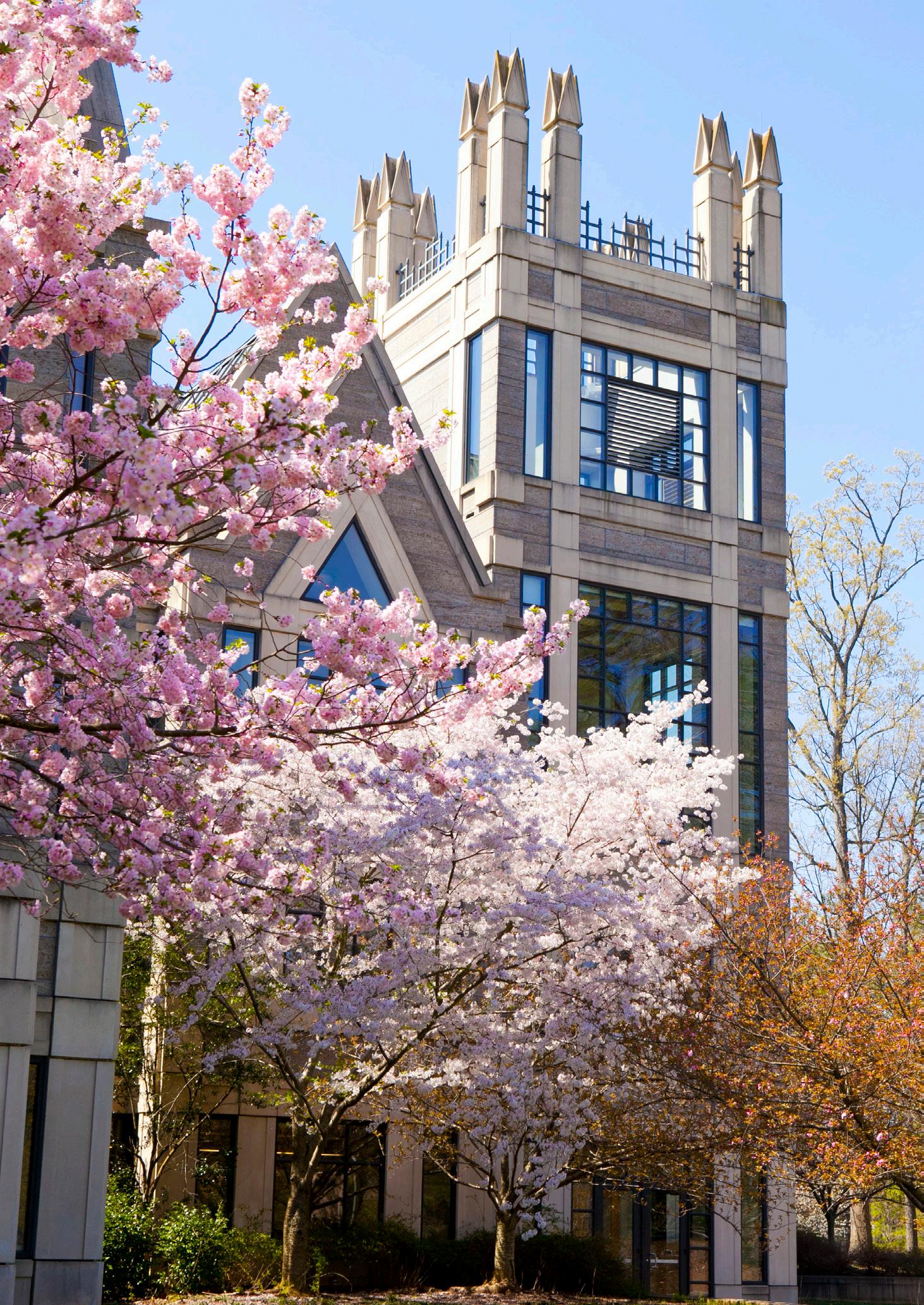
There is still time to register for summer courses!

Term 1: May 17–June 29
Term 2: July 3–August 13
Spend your summer with Duke getting ahead in your studies, discovering new subjects or making room for future study abroad.

Course list available on DukeHub.
For more information, visit SummerSession.duke.edu
Qualified Duke students may be considered for up to two terms of summer financial aid. Scan the code to learn more















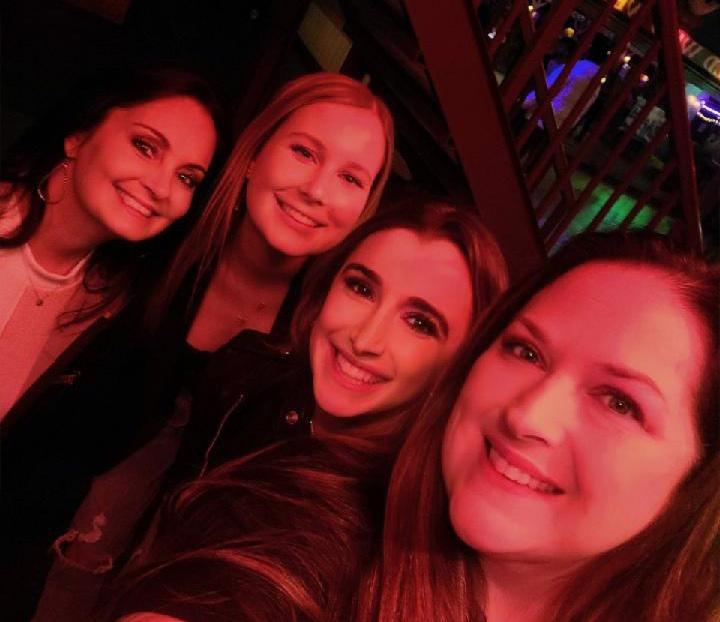
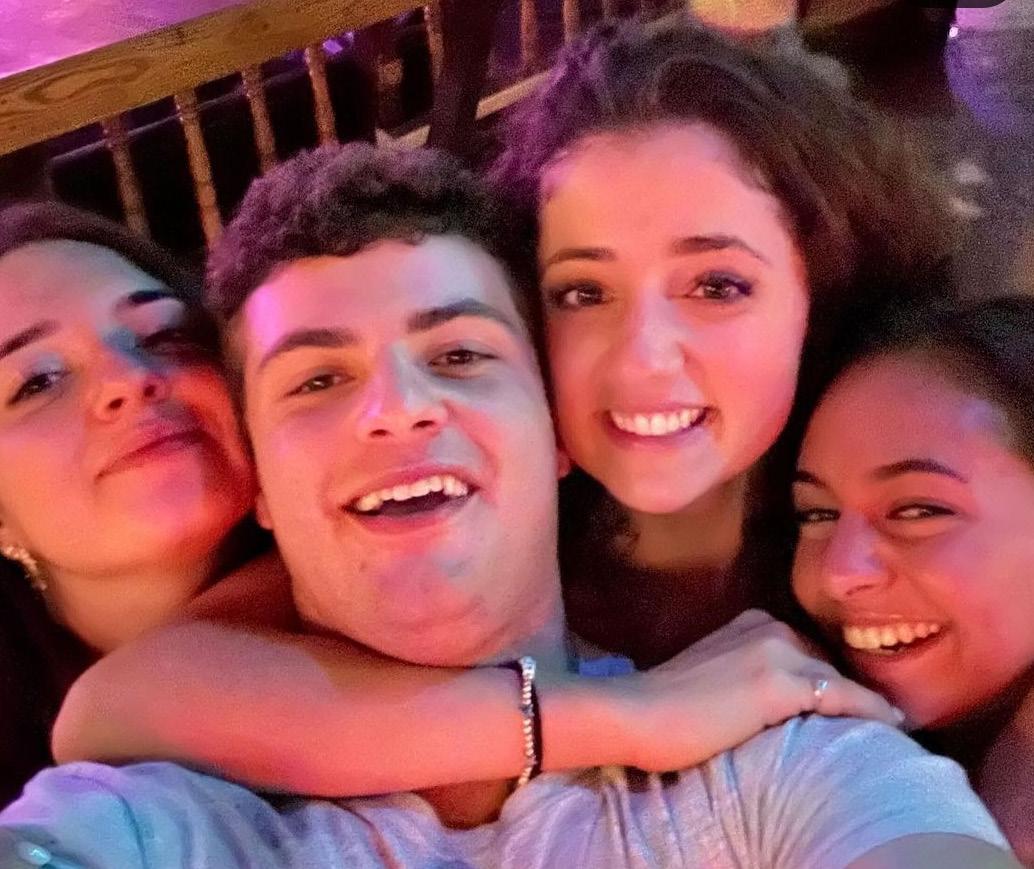


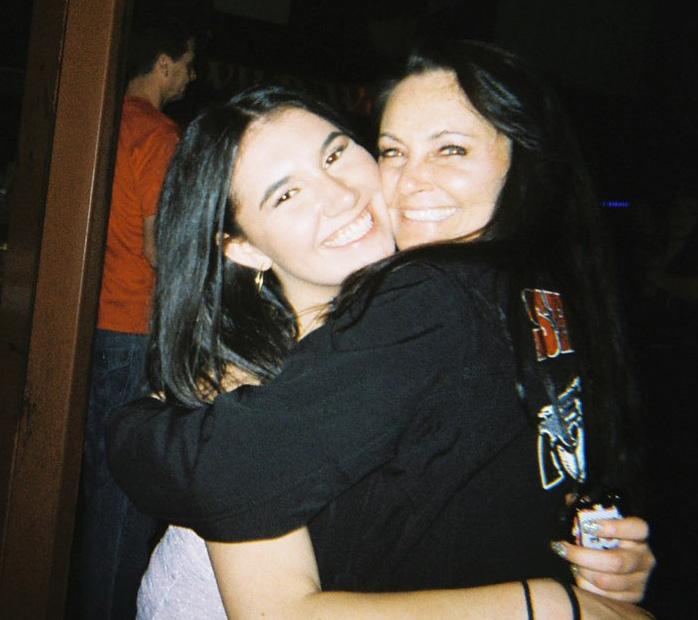



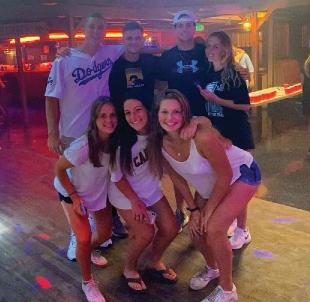
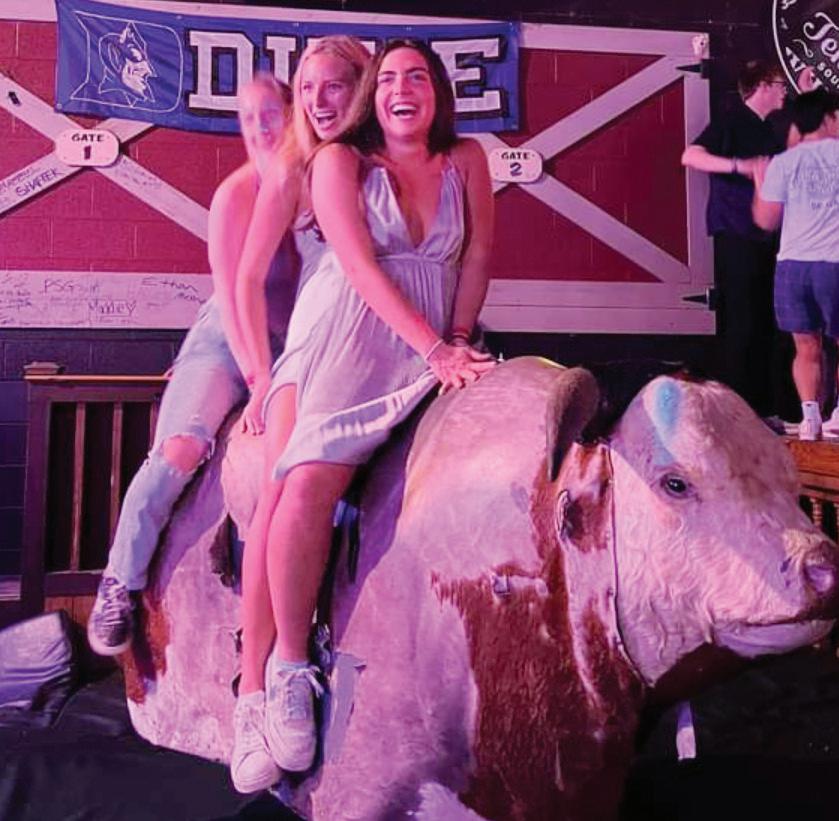



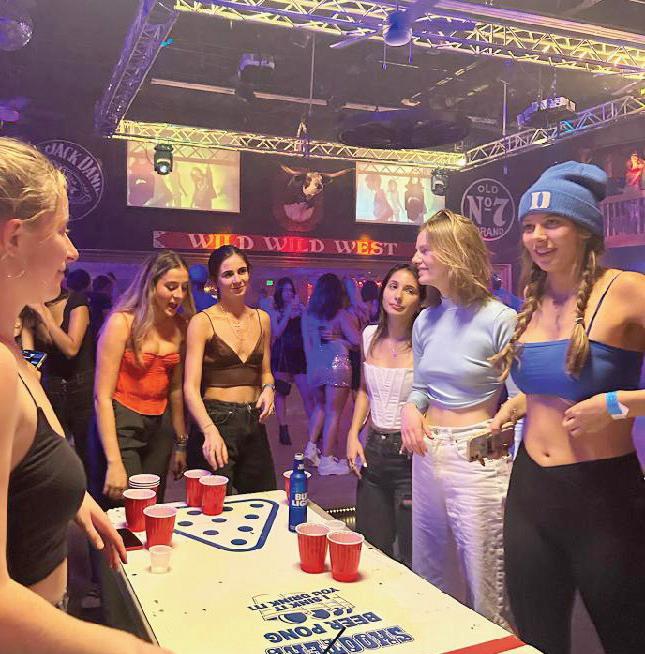
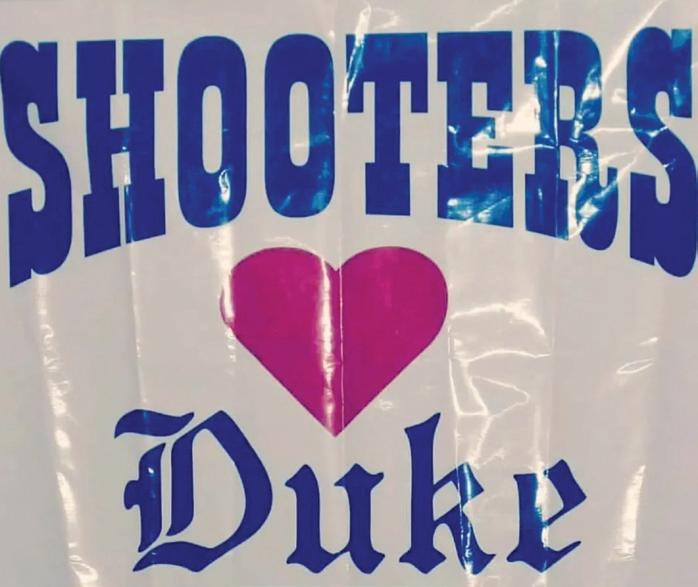

Congratulations to our

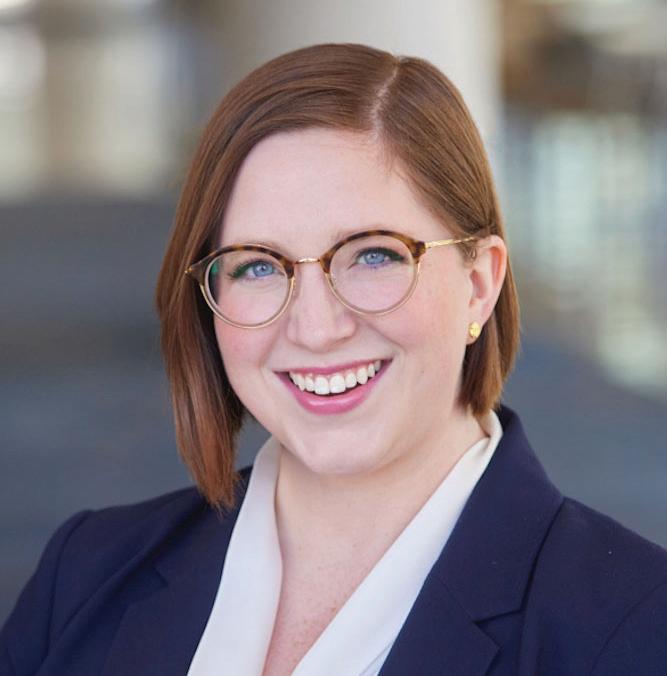
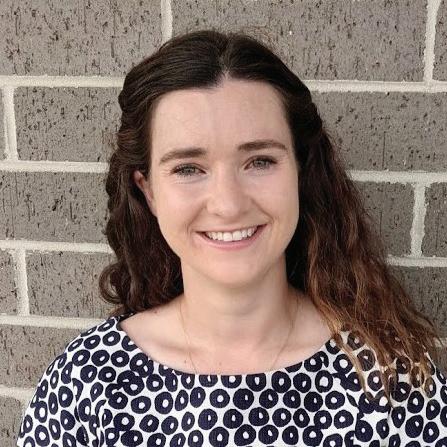
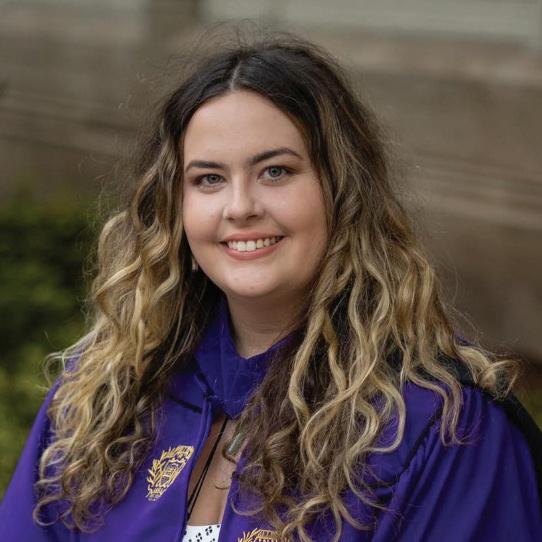

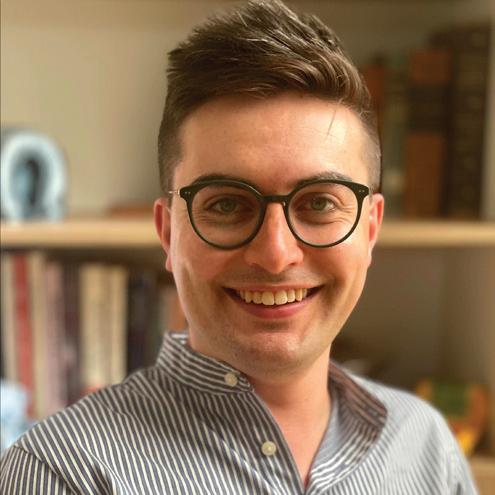





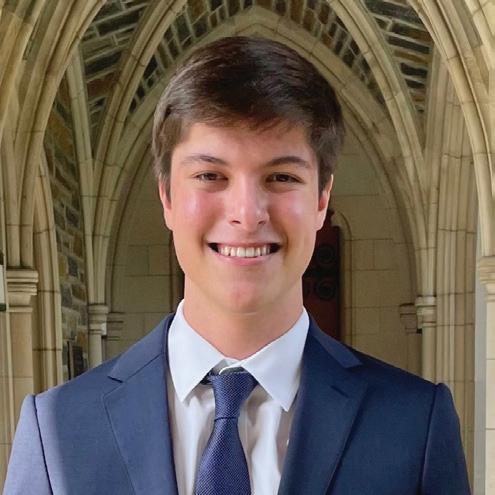

The Forever Duke Student Leadership Award recognizes graduating students from across campus who embody the “Forever Duke” spirit in their service to the university. Recipients are individuals of high integrity who have done great things not only at Duke but for Duke, and they are leaving the university a better place than they found it. Congratulations and welcome to the Duke Alumni family!


